How to Write a Synthesis Essay
Synthesis essays are common assignments in both high school and university, but that doesn’t mean they’re easy or that everyone knows how to write them. In this guide, we discuss everything you need to know in order to write one yourself. We talk about synthesis essay structure and offer some general tips, plus we clarify any confusion between a synthesis essay versus an argumentative essay.
Cite your sources with confidence Grammarly helps you avoid plagiarism Write with Grammarly

What is a synthesis essay?
A synthesis essay is a type of essay that combines points, data, and evidence from multiple sources and turns them into one idea that the writing revolves around. In other words, the writer synthesizes their own idea using other sources’ research and points. Usually, synthesis essays are a type of analytical essay , but they have crossover with other types of essays as well, such as argumentative essays .
The central idea in a synthesis essay is represented by the thesis statement , a sentence that succinctly explains the main point of the essay. In a synthesis essay, this “new” idea usually consolidates the main points and/or findings of other sources.
Synthesis essay structure
Creating a solid synthesis essay structure is one of the hardest parts of writing a synthesis essay. Unlike most other essay outlines , an outline for a synthesis essay has to include points from multiple sources, and such combinations don’t always have a logical or chronological sequence. To help you out, here are three strategies for creating a synthesis essay structure and sample outlines that you can use as templates.
Synthesis essay structure 1: By topic
The first kind of synthesis essay structure involves discussing each topic individually, mentioning each source’s perspective on it, and then moving on to the next topic. This approach lets you compare or join together points made by different sources about the same specific topic.
Structuring your synthesis essay by topic works best for more complicated ideas with different aspects that should be explored individually.
Example outline:
I. Introduction A. Thesis statement
II. Topic 1 A. Source A discussing Topic 1 1. A point or piece of evidence/data from Source A about Topic 1 2. Another point or piece of evidence/data from Source A about Topic 1 3. [Etc.]
B. Source B discussing Topic 1 1. A point or piece of evidence/data from Source B about Topic 1 2. [Etc.]
III. Topic 2 A. Source A discussing Topic 2 B. [Etc.]
IV. Topic 3 A. [Etc.]
[You can keep going like this with as many topics as you need.]
V. Conclusion A. Revisit thesis statement
Synthesis essay structure 2: By source
Alternatively, you can organize your synthesis essay structure by source: You discuss the main points of one source together and then move on to another source. This approach lets you compartmentalize the main points according to where they come from but ultimately bring together the main points from different sources.
Structuring your synthesis essay by source works best when you want to emphasize the sources themselves over the points they make. For example, if you were using this type of structure for an argumentative essay, you might want to fully discuss the source you’re refuting before making your counterargument.
II. Source 1 A. Source 1 discussing Topic A 1. A point or piece of evidence/data from Source 1 about Topic A 2. Another point or piece of evidence/data from Source 1 about Topic A 3. [Etc.]
B. Source 1 discussing Topic B 1. A point or piece of evidence/data from Source 1 about Topic B 2. [Etc.]
III. Source 2 A. Source 2 discussing Topic A B. Source 2 discussing Topic B C. [Etc.]
IV. Source 3 A. [Etc.]
[You can keep going like this for all your sources.]
V. Conclusion 1. Revisit thesis statement
Synthesis essay structure 3: Combine
The synthesis essay structures above are by no means set in stone. You’re free to adapt or modify them however you need and can even combine them.
For example, what if there’s a special source that stands out from the others? You could begin your synthesis essay by discussing each topic individually so that your reader understands the issue. Then you could switch it up and include a section just for that one special source, explaining that source’s stance on the previously discussed topics.
3 tips for writing a synthesis essay
1 come up with a strong thesis statement.
As mentioned above, a thesis statement is a single sentence that briefly explains the main point of your essay. In a synthesis essay, the thesis statement should effectively bring together the ideas and points from multiple other sources.
Part of writing a strong thesis statement comes from choosing your essay topic . Pick a topic that is broad enough to have sufficient research and enough other sources discussing it but specific enough that you can cover everything.
As for writing the actual thesis statement, a helpful method is to phrase your topic as a question and then answer it. The answer could be a good start to your thesis statement sentence. For example, let’s say your topic is how Denmark came to be first in clean energy. You could phrase the question and answer as:
Q: “Why is Denmark the leading country in renewable energy?”
A: “Denmark is first in clean energy thanks in part to energy conservation from district heating, combined heat-and-power stations, and its use of small, locally based power plants instead of larger ones.”
That answer could double as your thesis statement and mentions some of the other types of sources you use in your essay.
2 Read all the sources carefully
A synthesis essay is only as good as its sources. The nature of a synthesis essay is to build on its sources, so you need to choose the best ones and understand each of them thoroughly.
Make sure you comb through your sources so you don’t miss a good point or piece of evidence you could use in your essay. It helps to come up with your thesis statement early on so you can look for points related to it when you’re reading.
3 Write a gripping introduction
One of the keys to any good essay, synthesis or not, is a strong opening. This is partially determined by your thesis statement, but the other sentences in your introduction also make a big impact.
For starters, you can learn how to write a hook . In writing, a hook is something that grabs the reader’s attention and makes them want to keep reading. Hooks can essentially be anything interesting. Some common strategies for writing hooks include using personal anecdotes to create an emotional connection or providing exciting facts/statistics that the reader might not know.
Additionally, the introduction should also explain the scope of your topic and set the scene for people who aren’t familiar with it. The goal of the introduction is to prepare the reader for what follows so that afterward you can transition straight into making your points.
Synthesis essay vs. argumentative essay
Synthesis essays are often compared to argumentative essays, which attempt to refute, debunk, or criticize existing ideas or other research. The truth is that the two are not mutually exclusive. Although synthesis essays tend to be analytical or expository, they can also be argumentative.
A synthesis essay is any essay that combines ideas from multiple sources to create a new unified idea. If that new idea is a rebuttal to a preexisting idea and the entire essay is written as a critique, then the essay would be both synthesis and argumentative.
Synthesis essay FAQs
A synthesis essay is a type of essay that combines points, data, and evidence from multiple sources and turns them into one unified idea. In other words, the writer synthesizes their own idea using other sources’ research and ideas.
What is a good synthesis essay structure?
Traditionally, the common approaches to creating a synthesis essay structure are organizing by topic or organizing by source. The former means you discuss each source’s perspective on a topic before moving to the next topic; the latter means you discuss one source’s stance on each topic and then move to another source. You can also create a hybrid structure of the two for particular subjects.
What is the difference between a synthesis essay and an argumentative essay?
Synthesis essays are often contrasted with argumentative essays, but the truth is that the two are not mutually exclusive. For example, an argumentative essay can use the format of a synthesis essay—combining points from multiple sources to form a new unified idea—in order to refute a preexisting idea.

- Words with Friends Cheat
- Wordle Solver
- Word Unscrambler
- Scrabble Dictionary
- Anagram Solver
- Wordscapes Answers
Make Our Dictionary Yours
Sign up for our weekly newsletters and get:
- Grammar and writing tips
- Fun language articles
- #WordOfTheDay and quizzes
By signing in, you agree to our Terms and Conditions and Privacy Policy .
We'll see you in your inbox soon.
Well-Written Synthesis Essay Examples

- DESCRIPTION Research Synthesis Essay Outline
- SOURCE shironosov / iStock / Getty Images Plus
Essay writing is a craft many students have yet to master. Doing great research and having the right tools in place, such as synthesis essay examples and outlines, can make your writing process a breeze. Learn what it takes to write a synthesis essay through several example topics.
How to Write a Synthesis Essay
When it comes to a synthesis essay, it is all about the research. You must take a stand, but that position needs to be backed up by credible sources. Before you even start writing your essay , choose a topic . It needs to be something you can research and for which you can find informative and non-biased sources such as peer-reviewed journals.
Once you have your topic at hand, follow these steps:
- Create your thesis statement .
- Gather your research.
- Write an outline of your major points.
- Draft your essay .
Formatting a Synthesis Essay
Students typically write synthesis essays for high school AP language courses or college classes. Therefore, your professor will provide you with a writing guideline to follow like MLA or APA . These writing structures designate how you will cite your sources and format your bibliography .
Synthesis Essay Examples
With a basic understanding of a synthesis essay under your belt, dive right into the different examples. Use the synthesis essay examples to learn how to write a solid introduction and perfect conclusion to crush your AP lit class.
Synthesis Essay Introduction Example
This synthesis essay example discusses the topic of ‘is homeschooling a good idea?’ Learn how to craft a strong introduction in your essay.
In the movies, the doe-eyed homeschooler getting thrust into public education becomes either a comedy or horror fest. But does art truly mimic life when it comes to homeschooling? This might have been true of the religious-based homeschooling curriculum of the past, but in modern homeschooling education, students have access to online and personalized learning, socialization activities, and lasting friendships.
See this whole sample essay by clicking the Adobe PDF below.
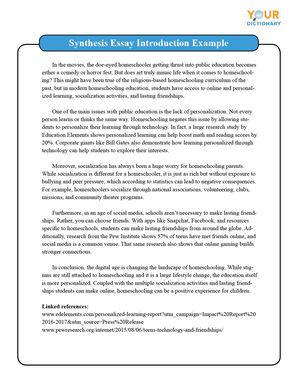
Synthesis essay introduction example
Synthesis essay thesis example.
Looking for how to craft a perfect thesis for your synthesis essay? Make sure it is to-the- point and lists your points to be covered like in this example about sexism associated with school dress codes.
Dress codes are everywhere. According to the National Center for Education statistics, more than 53% of schools have dress code guidelines. However, these standards to conform students and promote learning become sexist by targeting females, sexualizing clothing, and leading to a disproportionate loss of learning time.
Dive more into this synthesis essay below.
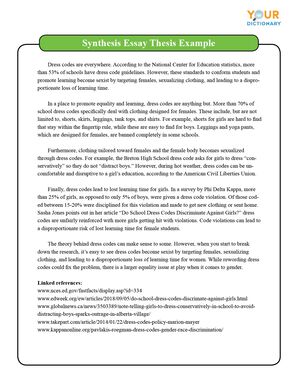
Synthesis essay thesis example
Ap high school synthesis essay example.
Put all your knowledge together to create a well-written essay, such as this one covering ‘does Facebook make people less social?’ See how all the parts come together to create a cohesive and expertly-researched argument.
Social media apps are a dime a dozen. Feeling lonely, all you must do is hop on Facebook to connect with your thousands of friends. However, are you truly connecting? Social media giants like Facebook are supposed to make us feel more connected; however, they can lead to loneliness, less face-to-face connections, and lower self-esteem. With thousands of friends, how could a person possibly feel lonely? Having thousands of friends means nothing if they aren’t true friends. According to research from the Massachusetts Institute of Technology, many people called friends on Facebook aren’t. There are few true friends you can rely on in social media. Additionally, these so-called friends are only showing you their best through their posts and tags, according to Sherry Turkle. This can make you feel more isolated and lonelier.
Want to see more? Click on the link.
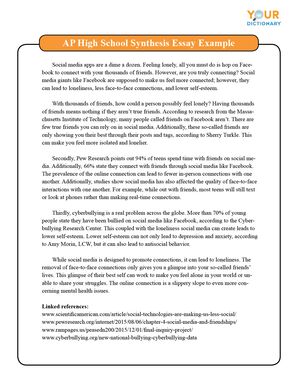
Ap high school synthesis essay example
Creating a great synthesis essay.
Writing great essays is an art form. To get everything perfect, all your parts need to come together seamlessly, which makes research and preparation key. Learn more about creating essays by studying how to write a cause and effect essay through fun and interesting examples .
Synthesis Essay
Synthesis Essay Example

Synthesis Essay Examples: Learn From Powerful Example
Published on: Jun 13, 2023
Last updated on: Oct 26, 2024

People also read
Writing a Perfect Synthesis Essay: Definition & Examples
Interesting Synthesis Essay Topics You Must Consider
Share this article
Are you feeling overwhelmed by the challenge of writing a compelling synthesis essay?
As a student, it can be frustrating to craft brilliant arguments that captivate readers and secure high marks. But fret not! We have the perfect solution to alleviate your writing woes.
In this blog, we present a collection of synthesis essay examples that will provide practical insights to overcome your writing hurdles. We will also discuss some synthesis essay topics and tips to write a good synthesis essay.
So, say goodbye to confusion and embrace the clarity that comes from learning through real-life examples.
Without further ado, let's start with the blog!
On This Page On This Page -->
What is Synthesis Essay?
A synthesis essay is defined as:
A type of academic writing that involves combining information from multiple sources to create a coherent argument on a specific topic.
The goal of a synthesis essay is to:
- Analyze the sources
- Draw connections between sources
- Present a unique perspective that integrates the information from the sources.
Synthesis Essay Examples
In this section, we will explore different examples of synthesis essays. Examples are a valuable tool for learning complicated concepts and understanding the format of a synthesis essay.
By examining these examples, you can see how the information from multiple sources is effectively utilized to build a cohesive argument.
Let's take a look at the sample synthesis essays below:
Synthesis Essay Introduction Example
Synthesis Essay Thesis Statement Example
Synthesis Essay Example Outline
AP High School Synthesis Essay Example
Argumentative Synthesis Essay Example
Explanatory Synthesis Essay Example
Poetry Synthesis Essay Sample
Technology Synthesis Essay
AP English Language and Composition Synthesis Essay
Synthesis Essay Example College Board
Synthesis Essay Example Ap Lang
Synthesis Essay Example MLA
Synthesis Essay Example APA
How to Write a Synthesis Essay?
Writing a synthesis essay can be an engaging and challenging task. It requires you to bring together information from multiple sources, analyze different viewpoints, and form a cohesive argument.
To help you navigate the writing process and create a well-structured synthesis paper, here are some essential steps:
Step#1 Understand the Assignment and Gather Relevant Sources
Before you begin writing, carefully read and understand the assignment prompt. Identify the main theme or topic and the sources you need to analyze and synthesize.
It's crucial to gather a variety of sources, such as scholarly articles, books, and reputable websites. By doing so you can ensure a comprehensive understanding of the subject matter.
Step#2 Create a Synthesis Essay Outline
A well-structured essay is essential for a good synthesis essay. Create an outline that organizes your thoughts and arguments logically.
Your synthesis essay outline should include an introduction, body paragraphs, and a conclusion. Each section should be clear and concise, providing a roadmap for your essay.

Step#3 Develop a Strong Thesis Statement
Your thesis statement is the central argument of your synthesis essay. It should be concise and clearly state your stance on the topic. A good thesis statement guides the direction of your essay and provides a framework for your synthesis.
Step#4 Evaluate and Analyze Sources
Thoroughly evaluate and analyze each source you've gathered. Identify the main ideas, key arguments, and supporting evidence presented in the sources. Look for common themes, patterns, or conflicts among the sources. This analysis will serve as the foundation for synthesizing the information in your essay.
Step#5 Synthesize Information
In the body paragraphs of your essay, synthesize the information from your sources. Do not summarize each source individually. Instead, aim to present a coherent analysis of the information by integrating different viewpoints and supporting evidence.
Make sure to attribute the ideas to the appropriate sources through in-text citations.

Paper Due? Why Suffer? That's our Job!
Step#6 Organize Your Synthesis
Organize your synthesis logically within each paragraph. You can structure your paragraphs based on themes, conflicting viewpoints, or supporting evidence. Ensure a smooth flow of ideas and transitions between paragraphs to maintain coherence and clarity.
Step#7 Craft a Strong Conclusion
In your conclusion, summarize the main points discussed in your essay and restate your thesis statement. Emphasize the significance of your findings and provide a thoughtful reflection on the topic. Leave your readers with a lasting impression and a sense of closure.
Check out this informative video to learn more about synthesis essays!
Synthesis Essay Format
Let’s take a look at the basic synthesis essay format:
- Introduction : Introduce the topic and provide background information. Present your thesis statement.
- Body paragraphs: Analyze and synthesize the information from your sources, supporting your thesis statement.
- Conclusion : Summarize your main points and restate your thesis. Provide a thoughtful reflection on the topic.
Synthesis Essay Topics
Here are synthesis essay example topics in different subject domains:
- The impact of technology on climate change mitigation efforts.
- Synthesis of renewable energy sources for a sustainable future.
- The ethical implications of genetic engineering and synthetic biology.
- Synthesizing scientific research to understand the effects of sleep on human health.
- Exploring the potential benefits and risks of artificial intelligence in healthcare.
Social Sciences:
- Synthesizing theories of social inequality to understand its impact on marginalized communities.
- The role of media in shaping public opinion and political discourse.
- Synthesizing psychological and sociological perspectives on addiction and substance abuse.
- Analyzing the impact of globalization on cultural diversity and identity.
- Synthesizing different approaches to criminal justice reform for reducing recidivism rates.
Literature:
- The portrayal of gender roles and stereotypes in classic and contemporary literature.
- Synthesizing different literary techniques used to convey the theme of love in poetry.
- Comparing and contrasting the themes of justice and revenge in various Shakespearean plays.
- Synthesizing the works of different postcolonial authors to understand the impact of colonialism on identity.
- Exploring the use of symbolism in dystopian literature to critique societal norms.
- Synthesizing different historical perspectives on the causes of World War II.
- The impact of the Enlightenment on the American and French Revolutions.
- Synthesizing primary sources to understand the experiences of enslaved individuals during the transatlantic slave trade.
- Analyzing the effects of the Industrial Revolution on social and economic conditions in 19th-century Europe.
- Comparing and contrasting the approaches to decolonization in Africa and Asia.
Technology:
- Synthesizing different perspectives on the ethical implications of autonomous vehicles.
- The impact of social media on communication and interpersonal relationships.
- Synthesizing the benefits and risks of data mining in the era of big data.
- Analyzing the role of technology in addressing global challenges such as poverty and climate change.
- Exploring the potential applications of blockchain technology in various industries.
Need more topics? Check out our synthesis essay topics blog and get plenty of ideas!
Tips for a Good Synthesis Essay
Here are some tips to write an outstanding synthesis essay:

- Choose a topic that is broad enough to have sufficient sources but narrow enough to focus your analysis effectively.
- Take notes while reading and analyzing your sources to keep track of key points and ideas.
- Use in-text citations and include works cited page to give credit to the original authors and avoid plagiarism.
- Maintain a balanced approach by presenting different viewpoints and addressing counterarguments.
- Edit and revise your essay for clarity , coherence, and grammar mistakes.
In conclusion, writing a good synthesis essay requires careful planning, thorough research, and effective organization. By following a proper synthesis essay structure and employing proper writing techniques, you can write a strong synthesis essay.
Start writing your essay early to allow ample time for the writing process, revisions, and edits. With practice and persistence, you can develop your skills in crafting compelling synthesis essays.
Still do not know how to start with your synthesis essay? Don't worry! CollegeEssay.org is here to help.
Our dedicated synthesis essay writing service is readily available to help you with your writing tasks. We guarantee 100% plagiarism-free papers tailored to your needs.
Don't hesitate to reach out to our professional essay writing service today!
Caleb S. (Literature, Marketing)
Caleb S. has extensive experience in writing and holds a Masters from Oxford University. He takes great satisfaction in helping students exceed their academic goals. Caleb always puts the needs of his clients first and is dedicated to providing quality service.
Need Help With Your Essay?
Also get FREE title page, Turnitin report, unlimited revisions, and more!
Keep reading

50% OFF ON CUSTOM ESSAYS
Essay Services
- Argumentative Essay Service
- Descriptive Essay Service
- Persuasive Essay Service
- Narrative Essay Service
- Analytical Essay Service
- Expository Essay Service
- Comparison Essay Service
Writing Help
- Term Paper Writing Help
- Research Writing Help
- Thesis Help
- Dissertation Help
- Report Writing Help
- Speech Writing Help
- Assignment Help
Legal & Policies
- Privacy Policy
- Cookies Policy
- Terms of Use
- Refunds & Cancellations
- Our Writers
- Success Stories
- Our Guarantees
- Affiliate Program
- Referral Program
Disclaimer: All client orders are completed by our team of highly qualified human writers. The essays and papers provided by us are not to be used for submission but rather as learning models only.
- High School
- You don't have any recent items yet.
- You don't have any courses yet.
- You don't have any books yet.
- You don't have any Studylists yet.
- Information
Synthesis and Reflection essay
English 103 (engl103), macewan university, recommended for you, students also viewed.
- Trifles.english. - 74%
- Research Essay Final. - 8/10
- 103 Short Essay Wi 24 online
- Research Essay - Addiction
- English Short Essay
- Response paper technology
Related documents
- Arguementative Essay
- APA document 2018 to 2019- Essays
- Excellent essay - Grade: A+
- Boys and Girls by Alice Munro
- Poetry Analysis Assignment ENG 103
- Argumentative essay english
Preview text
Adam Muhareb
Professor Hutchinson
7 December 2020
For this essay I have decided to read the following papers: Corder, Jim W. "Argument as Emergence, Rhetoric as Love", Didion, Joan. "Why I Write", Klass, Perri. "HERS". All these papers have a certain similar factor that makes the paper an excellent piece of writing; this element, in my opinion, is having a real interest in what the topic they are writing about is. This interest can result from writing about a personal subject and mixes with finding true joy in writing in a general sense. In "Argument as Emergence, Rhetoric as Love", Corder goes on about how authors live what they write, "We tell our lives and live our tales, enjoying where we can, tolerating what we must, turning away to re-tell, or sinking into madness and disorder if we cannot make our tale into a narrative we can live in (16)." The factor of having interest in your writing because you are speaking from personal experience is most prominent in "Argument as Emergence, Rhetoric as Love", however, it can also be seen in the other two pieces of writing. As for myself, I write from a point of requirement. I lack the interest of whatever topic I may be writing about. Writing in excellence, in my opinion, requires the writer to have a high degree of care for the topic and to also be writing from personal experience; this is what I lack when it comes to writing.
In "Why I Write" written by Didion, Joan, she states that “ In my way writing is the act of saying, of imposing oneself upon other people, of saying listen to me, see it my way, change your mind”(p2). In simpler terms, the author is implying that she uses her personal life to impose onto her writing and into her characters. In addition, a person whose career is based on writing makes it obvious that the individual has a passion for writing, therefore, this action mixed with a real love for writing will undeniably make a great piece of writing. But personally, I do not have a fondness for writing, this results in my writing to come off as forced and makes it seem like I put in minimal effort towards my writing. As for “HERS” written by Klass, Perri. Klass writes about her time being a medical student. This comes back to my point about writing from personal experience which results in an emotional attachment with your writing and in turn creates a love for what you are writing about.
In conclusion, writing in excellence, in my opinion, requires the writer to have a high degree of care for the topic and to also be writing from personal experience; this is what I lack when it comes to writing. As I have mentioned before writing from a point of demand makes the writing seem forced and written with minimal effort. This is how I have felt throughout this course. On the other hand, if a piece of writing came from a place of passion for the topic there is no doubt it would be a limited piece of writing.
Works Cited
Didion, Joan. “Why I Write.” The New York Times, The New York Times, 5 Dec. 1976, nytimes/1976/12/05/archives/why-i-write-why-i-write.html.
Klass, Perri.. “HERS.” The New York Times, 4 Oct. 1984, nytimes/1984/10/04/garden/hers.html.
Cervantes, Daphne. “Corder - Rhetoric as Love.” Summary and Synthesis, daphnecervantes.weebly/corder---rhetoric-as-love.html#:%7E:text=Corder %20wrote%20a%20lecture%20called,lives%20and%20live%20our%20tales%2C. Accessed 9 Dec. 2020.
Balditukurfessa. “” Why i Write” Summary.” Balditukurfessa, 11 Apr. 2012, balditukurfessa.wordpress/2012/04/11/why-i-write-summary.
- Multiple Choice
Course : English 103 (ENGL103)
University : macewan university, this is a preview.
Access to all documents
Get Unlimited Downloads
Improve your grades
Share your documents to unlock
Get 30 days of free Premium

Why is this page out of focus?
- College Essay
- Argumentative Essay
- Expository Essay
- Narrative Essay
- Descriptive Essay
- Scholarship Essay
- Admission Essay
- Reflective Essay
- Nursing Essay
- Economics Essay
Assignments
- Term Papers
- Research Papers
- Case Studies
- Dissertation
- Presentation
- Write My Assignment
- Editing Help
- Cheap Essay Writing
- How to Order
Synthesis Essay Writing
Synthesis Essay Examples
15 Synthesis Essay Examples: Tips & Expert Guidance

People also read
Learn How to Write a Synthesis Essay Step by Step
Best Synthesis Essay Topics and Prompt Ideas
Synthesis Essay Outline - Template and Examples
Are you struggling to make sense of synthesis essays, unsure where to begin, or how to enhance your writing?
Many students face the challenge of feeling overwhelmed when trying to blend diverse ideas and sources seamlessly. It can be challenging to create a cohesive piece that draws from various perspectives.
But fear not!
In this blog, we will provide you with winning synthesis essay examples and valuable insights to enhance your essay writing skills.
So, let’s get started.
- 1. Understanding What A Synthesis Essay Is
- 2. Synthesis Essay Examples
- 3. Synthesis Essay Example Prompts
- 4. Synthesis Essay Topics - Examples
- 5. Tips for Writing an Effective Synthesis Essay
Understanding What A Synthesis Essay Is
A synthesis essay is a special kind of academic writing where writers blend ideas and information from multiple sources to create a clear and organized argument.
Unlike other types of essays , a synthesis essay demands the integration of various perspectives to form a new understanding or insight.
It involves critically examining different sources, and synthesizing them to develop a comprehensive viewpoint on a particular topic.
Looking at synthesis essay examples can really help you write a great essay. Here's a good synthesis essay example to inspire your writing:
Here’s another sample essay:
Marc And Carly Synthesis Essay Example
Synthesis Essay Outline Example
An outline is just like a table of content sections on a page. It consists of categories and subcategories of a given topic that the writer plans to cover in the essay.
Below is a synthesis essay outline template that explains the outline structure in detail. Have a look at it.
Synthesis Essay Example Outline
Synthesis Essay Example Thesis

Tough Essay Due? Hire Tough Writers!
How to Write a Synthesis Essay - Example
In order to write a good synthesis paper, you need to follow the format and proper procedure. The synthesis essay has an introduction paragraph, three body paragraphs with supportive evidence to back up the topic, and a thesis statement .
And a conclusion paragraph where you answer all the questions while referring back to the main thesis.
Check out this sample template; it will help you learn the basics of synthesis essay structure.
AP English Language and Composition Synthesis Essay Example
The AP Lang synthesis essay requires students to analyze information from various sources to discuss the topic of their essays. Refer to the sample AP language synthesis essay to learn how you can write a perfect synthesis essay.
Synthesis Essay Example Ap Lang
2022 Ap Lang Synthesis Essay Example
Synthesis Essay Examples for Different Formats
Knowing how to write synthesis essays in different styles is important. Given below are some examples of synthesis essays in different formats.
- APA Format Synthesis Essay Example
APA (American Psychological Association) is a citation style that provides formatting conventions for student and professional papers. Below is a sample example of an APA-style synthesis essay.
Synthesis Essay Example APA
- MLA Format Synthesis Essay Example
MLA (Modern Language Association) is another referencing style that allows us to cite the sources using a proper citation format. Here is an MLA-style synthesis essay example to help you learn the basics of this style.
Synthesis Essay Example MLA
Examples of Different Synthesis Essay Types
Synthesis essays come in various types, each requiring a unique approach. Explore the following synthesis essay examples tailored to different types, offering a comprehensive overview of how to tackle diverse writing tasks:
- College Synthesis Essay Example
This sample PDF is to help college students learn the outline, format, and structure of the synthesis essay. You can easily download it and save it with you for further use.
Synthesis Essay Example College Board
Explanatory Synthesis Essay Example
The explanatory synthesis is intended to explain a particular subject in detail to make it easy to understand for people. Refer to the sample essay given below and see what makes it different from a simple synthesis essay.
Argumentative Synthesis Essay Example
Argumentative synthesis is another type of synthesis essay that is intended to present an argument. The writer presents his claim and supports it with facts and evidence to prove it right. Check out the sample essay given below to understand how it is different from a general argumentative essay .
Eminent Domain Synthesis Essay Example
An eminent domain synthesis essay explores the concept of eminent domain, which is the government's authority to take private property for public use. This type of synthesis essay inquires into various aspects of eminent domain, considering legal, ethical, and social perspectives.
Here’s an example:
- Synthesis Essay Example About Social Media
This type of synthesis essay explores the impact of social media on individuals and society. It aims to analyze and synthesize information to construct a well-rounded understanding of the role of social media in our lives. Here’s an example of it:
Social Media Synthesis Essay Example
Synthesis Essay Example Prompts
Here are five prompts to kickstart your synthesis essay:
- Compare the effects of renewable energy on the environment versus its economic impact on traditional energy sectors
- Evaluate how social media platforms enhance global communication while contributing to rising mental health concerns
- Assess the advantages and drawbacks of integrating technology in classrooms from both student and educator viewpoints
- Investigate the environmental and ethical repercussions of fast fashion and suggest sustainable alternatives
- Analyze the role of online learning in bridging or widening educational gaps among students from different socio-economic backgrounds
Synthesis Essay Topics - Examples
Choosing a compelling topic is very important when writing a synthesis essay. Here are some thought-provoking synthesis essay topics that can inspire your writing:
- The Impact of Technology on Human Interaction
- Climate Change and Global Sustainability
- The Role of Social Media in Modern Society
- The Intersection of Artificial Intelligence and Ethics
- Education Reform: Challenges and Opportunities
- Impact of Social Movements on Policy Change
- Healthcare Access: A Global Perspective
- Cultural Diversity in the Workplace
- The Influence of Literature on Society
- The Future of Work: Remote vs. Traditional
Looking for more topics? Check out this blog on synthesis essay topics for inspiration.
Paper Due? Why Suffer? That's our Job!
Tips for Writing an Effective Synthesis Essay
A strong synthesis essay goes beyond the writing process; it requires strategic planning and meticulous execution. Here are key points to make sure your synthesis essay stands out:
- Select Credible Sources
Begin by choosing reliable and credible sources. Make sure that the information you gather is from reputable authors, organizations, or publications to strengthen the foundation of your essay.
- Background Information is Key
Provide sufficient background information on your chosen topic. Help your readers understand the context and significance of the subject matter before jumping to your argument.
- Develop a Coherent Argument
Focus on building a clear and coherent argument throughout your essay. Each paragraph should focus on contributing to the overall flow and support your thesis.
- Support Your with Evidence
A strong synthesis essay requires a well-supported argument. Back up your claims with evidence from your chosen sources, demonstrating a thorough understanding of the topic.
- Utilize Sources to Support Each Other
Instead of treating sources in isolation, highlight their relationships. Demonstrate how each source complements or contrasts with others, emphasizing the interconnectedness of your information.
- Synthesis Essay Requires Critical Analysis
Go beyond summarizing your sources; engage in critical analysis. Evaluate the strengths and weaknesses of each source and consider their implications for your argument.
- Backup Your Argument:
Throughout your essay, consistently reinforce your central argument. Every piece of information should contribute to and reinforce the main thesis, creating a cohesive and persuasive narrative.
In conclusion , tackling synthesis essays is easier than it seems when armed with the right knowledge. Use the tips and examples provided to boost your skills and approach these essays with confidence.
However, if all of the instructions seem overwhelming, you might want to get expert help. “ Can I pay someone to do my essay ?” Yes, you can.
At MyPerfectWords.com , our team of experienced writers is here to provide custom essays that meet your expectations. For top-notch essay writing help online, our experts are just a click away.
Whether you are looking for an essay for college or university, our team guarantees your work not only meets standards but stands out for its clarity and depth.
Ready to elevate your writing? Hire an expert from our platform today!
Frequently Asked Questions
What are some examples of synthesis in writing.
Synthesis in writing is when you combine information from different sources to form a clear, unified idea. For example:
- In a research paper , you might summarize several studies to highlight a common theme.
- In an argumentative essay , you pull together evidence from different places to support your point.
- In a compare and contrast essay , you blend details from multiple sources to show how two things are alike or different.
It's all about bringing various pieces together to create a new, complete picture.

Write Essay Within 60 Seconds!

Dr. Barbara is a highly experienced writer and author who holds a Ph.D. degree in public health from an Ivy League school. She has worked in the medical field for many years, conducting extensive research on various health topics. Her writing has been featured in several top-tier publications.
Struggling With Your Paper?
Get a custom paper written at
With a FREE Turnitin report, and a 100% money-back guarantee
LIMITED TIME ONLY!
Keep reading
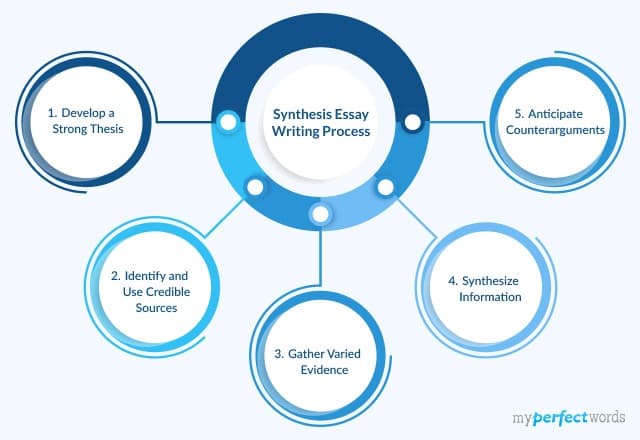
OFFER EXPIRES SOON!

Synthesis Essay
Synthesis essay generator.
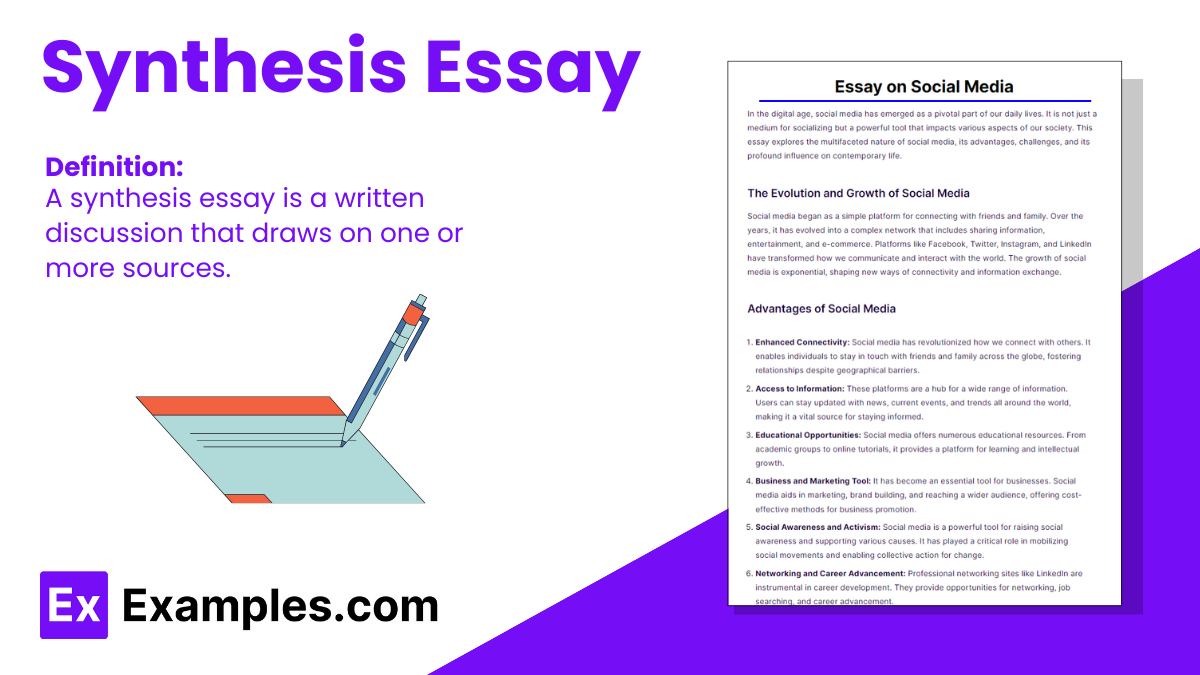
A Synthesis Essay is a sophisticated form of writing that requires the integration of various sources and perspectives. Our resource provides a comprehensive look into this writing style, complete with insightful essay examples . These examples demonstrate how to effectively combine information from different texts, crafting a cohesive and well-argued narrative. Ideal for students and professionals alike, this guide will help you master the art of synthesizing diverse viewpoints into a single, compelling argument in your essays.
What is a Synthesis Essay?
A synthesis essay is a written discussion that draws on one or more sources. It involves combining information from various sources to make a cohesive argument or presentation on a specific topic. This type of essay requires the writer to analyze information, derive insights, and present them in a structured and coherent manner. The key to a successful synthesis essay is not just summarizing the sources but integrating them to create a new perspective or argument. Writers must cite their sources accurately, showing how each piece of information contributes to and supports their thesis or main argument. Synthesis essays are common assignments in academic settings, especially in higher education, testing students’ abilities to research, evaluate, synthesize complex information, and articulate their findings effectively.
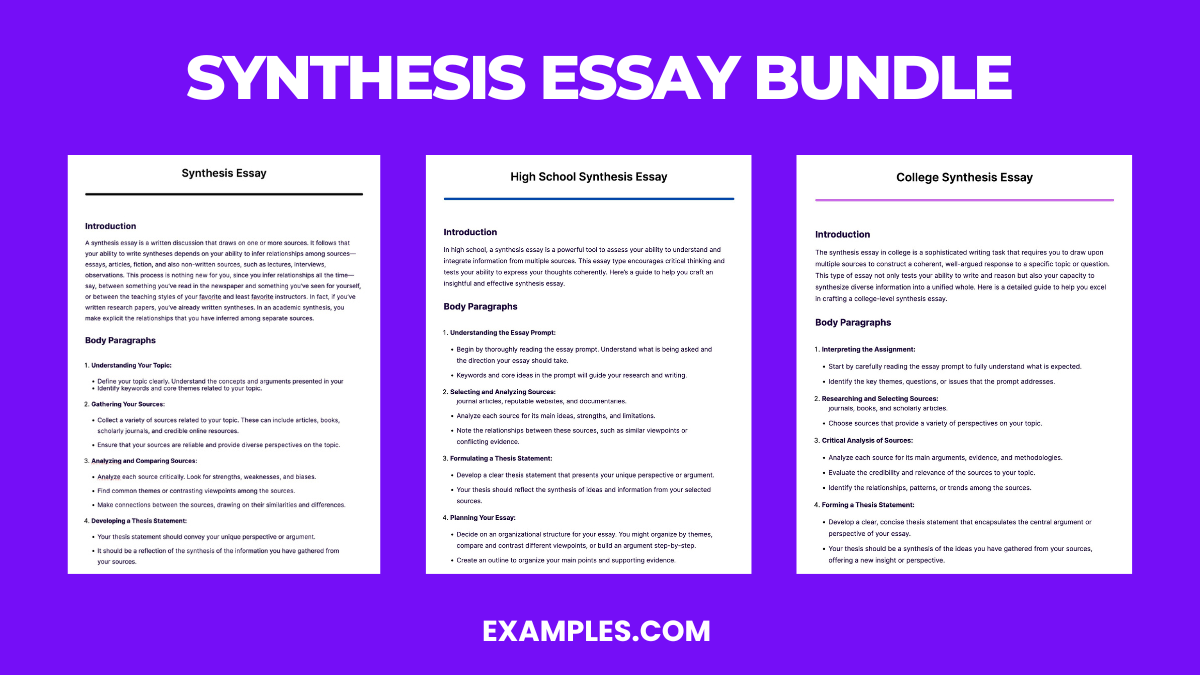
Download Synthesis Essay Bundle
Essays depict the standpoints of a writer on a certain topic or issue. An essay often presents a point and either convinces a reader to agree or disagree to a certain subject matter. An effective essay does what it is intended to do when a reader is convinced of the writer’s stand point. Common college essays include writing a synthesis essay. Examples of synthesis essay can be found in the page and made available for your reference. The examples can also be downloaded via the download link button below the sample in order to get a closer look.
Synthesis involves combining different pieces of information to form a cohesive understanding. For instance, if you gather insights from various experts about the impact of climate change and weave them into a comprehensive article or report, you are performing synthesis. This process is distinct from merely summarizing since it requires critical thinking to integrate ideas and form new connections, rather than just listing details or differences like in comparison and contrast.
Synthesis Essay Structure
It helps in presenting your argument clearly and persuasively. Here’s a typical structure for a synthesis essay:
Introduction
Hook: Start with an engaging sentence to grab the reader’s attention. Background Information: Provide some context or background for the topic you will be discussing. Thesis Statement: Present your main argument or position on the topic, clearly stating how the different sources will support your thesis.
Body Paragraphs
Each body paragraph should focus on a specific point or aspect of your thesis, integrating multiple sources to support each point.
Topic Sentence: Introduce the main idea of the paragraph that supports your thesis. Evidence and Analysis: Include information from your sources as evidence to back up your point. This could be quotations, summaries, or paraphrased material. Analyze the evidence, showing how it supports your argument. Synthesis: Discuss how the evidence from different sources relates to each other and to your thesis. This is where you combine (synthesize) the information to build your argument. Concluding Sentence: Summarize the main point of the paragraph and how it supports your overall thesis.
Counterarguments (Optional)
Consider including a paragraph that addresses potential counterarguments or opposing views. Refute these arguments and show how your thesis still stands.
Summary: Briefly summarize the key points you made in your body paragraphs. Thesis Restatement: Restate your thesis in a new way, reflecting the insights and arguments developed in your essay. Final Thoughts: Offer some final thoughts on the topic, possibly suggesting areas for further research or implications of your argument.
Include a list of all sources cited in your essay, formatted according to the required academic style guide (e.g., APA, MLA, Chicago).
How to Write a Synthesis Essay
Writing a synthesis essay involves gathering information from various sources and merging these insights to support a central thesis or argument. Here’s a step-by-step guide:
Understand the Prompt
- Clarify the Task: Ensure you fully understand the essay prompt or assignment requirements. Know what type of synthesis essay you are writing (explanatory or argumentative).
- Identify the Main Ideas: Determine what themes or ideas you need to explore based on the prompt.
Conduct Research
- Gather Sources: Collect relevant sources that provide information on your topic. These can include academic papers, books, articles, and credible online resources.
- Evaluate Sources: Assess the credibility and relevance of each source to your topic.
Develop a Thesis Statement
- Formulate a Clear Argument: Based on your research, craft a thesis statement that encapsulates the main argument or perspective your essay will support.
Create an Outline
- Organize Your Points: Plan the structure of your essay, deciding how you will integrate information from your sources to support your thesis.
- Outline Body Paragraphs: Each paragraph should focus on a specific point or piece of evidence related to your thesis. Determine how you will synthesize information from different sources for each point.
Revise and Proofread
- Review Your Work: Check for clarity, coherence, and logical flow. Ensure each part of your essay effectively contributes to supporting your thesis.
- Proofread: Correct any grammatical, spelling, or punctuation errors. Make sure your citations and references are formatted correctly.
Cite Your Sources
- Follow Formatting Guidelines: Use the appropriate academic style (APA, MLA, Chicago, etc.) to cite your sources within the text and in a bibliography or works cited page.
10+ Synthesis Essay Samples
- Synthesis Essay on Climate Change
- Synthesis Essay on Death
- Synthesis Essay on Education
- Synthesis Essay on Environment
- Synthesis Essay on Food
- Synthesis Essay on Gender Inequality
- Synthesis Essay on Internet
- Synthesis Essay on Social Media
- Synthesis Essay on Technology
- Synthesis Essay on Unemployment
10+ Synthesis Essay Examples
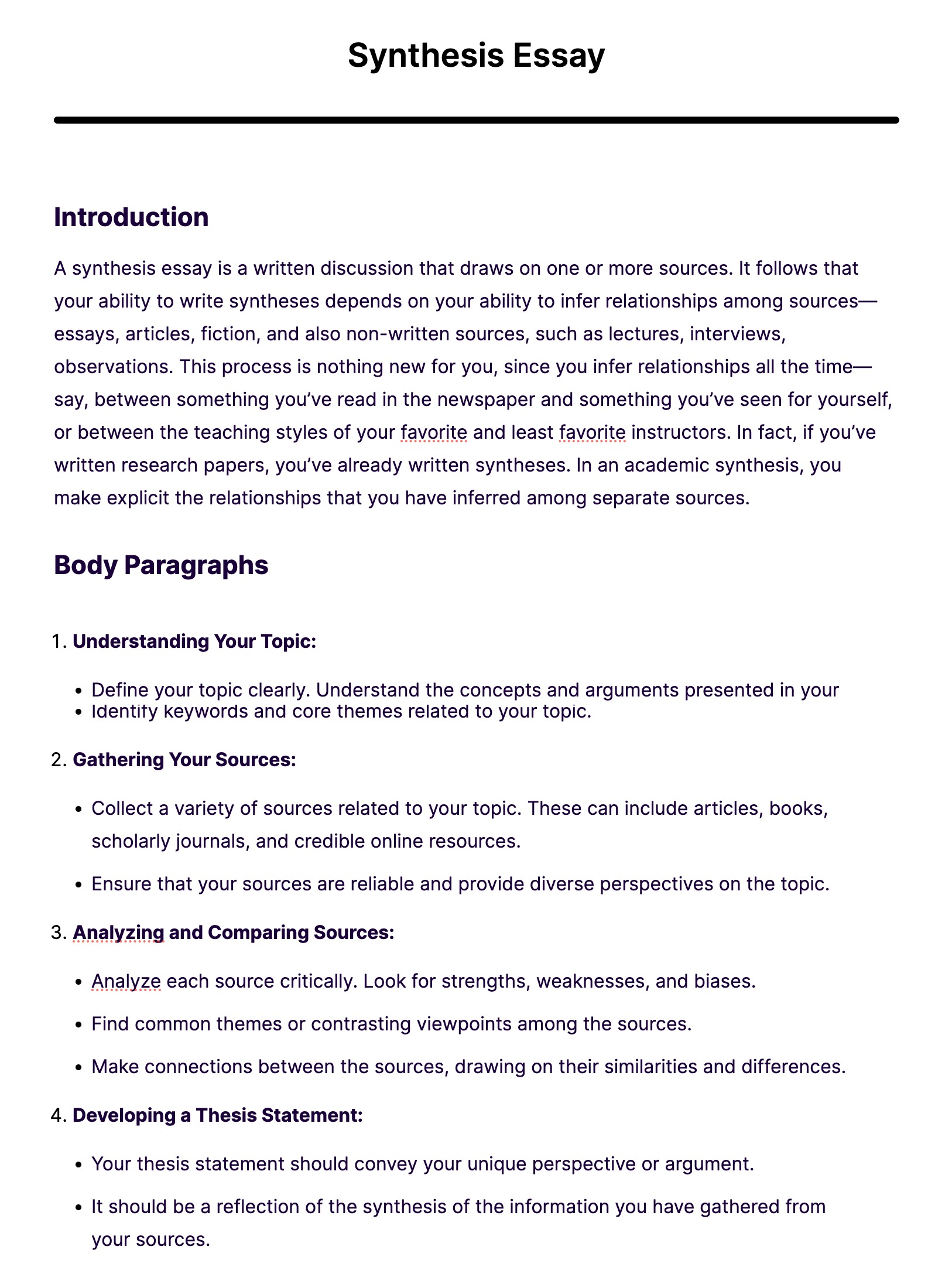
Free Download
College Synthesis Essay
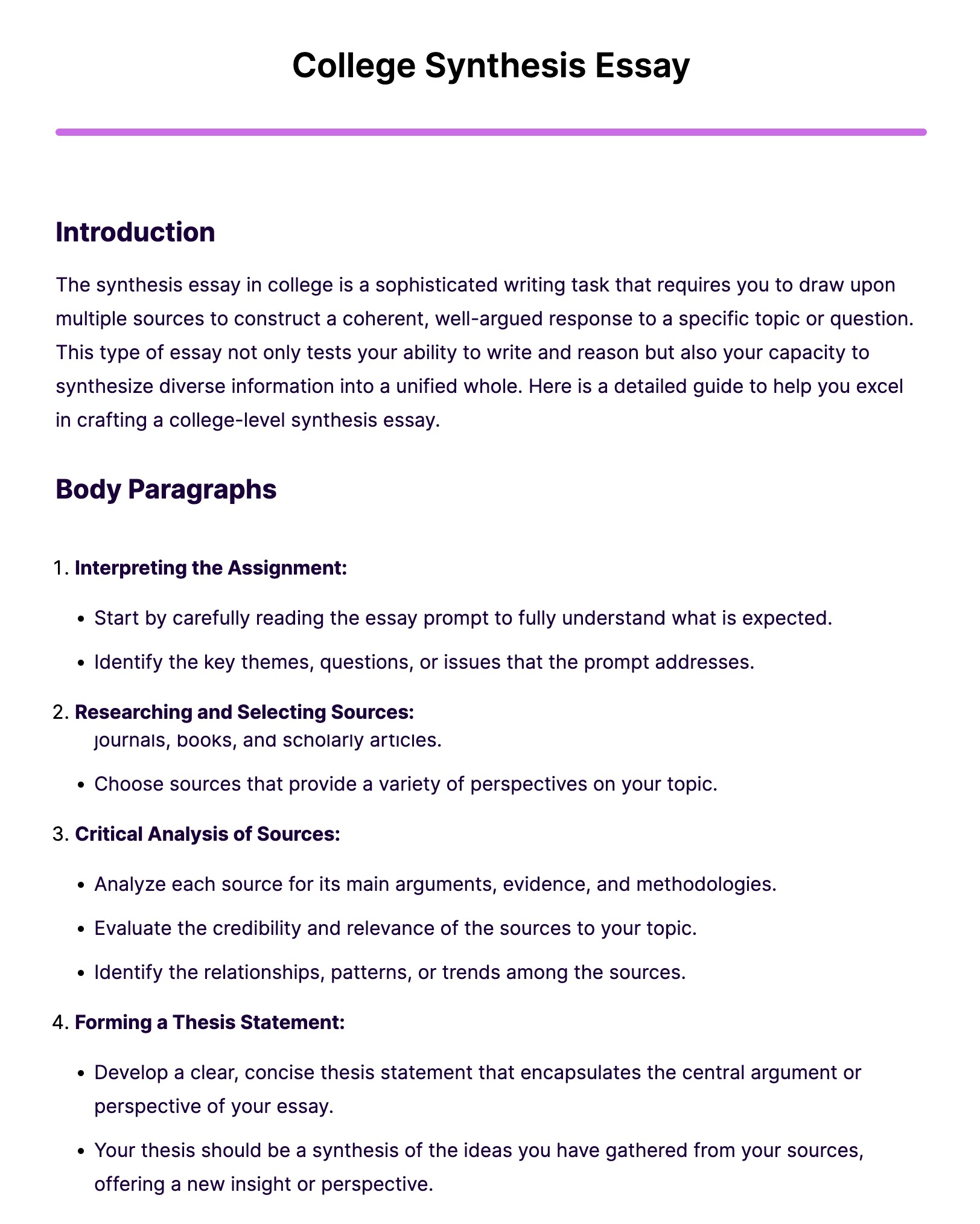
High School Synthesis Essay
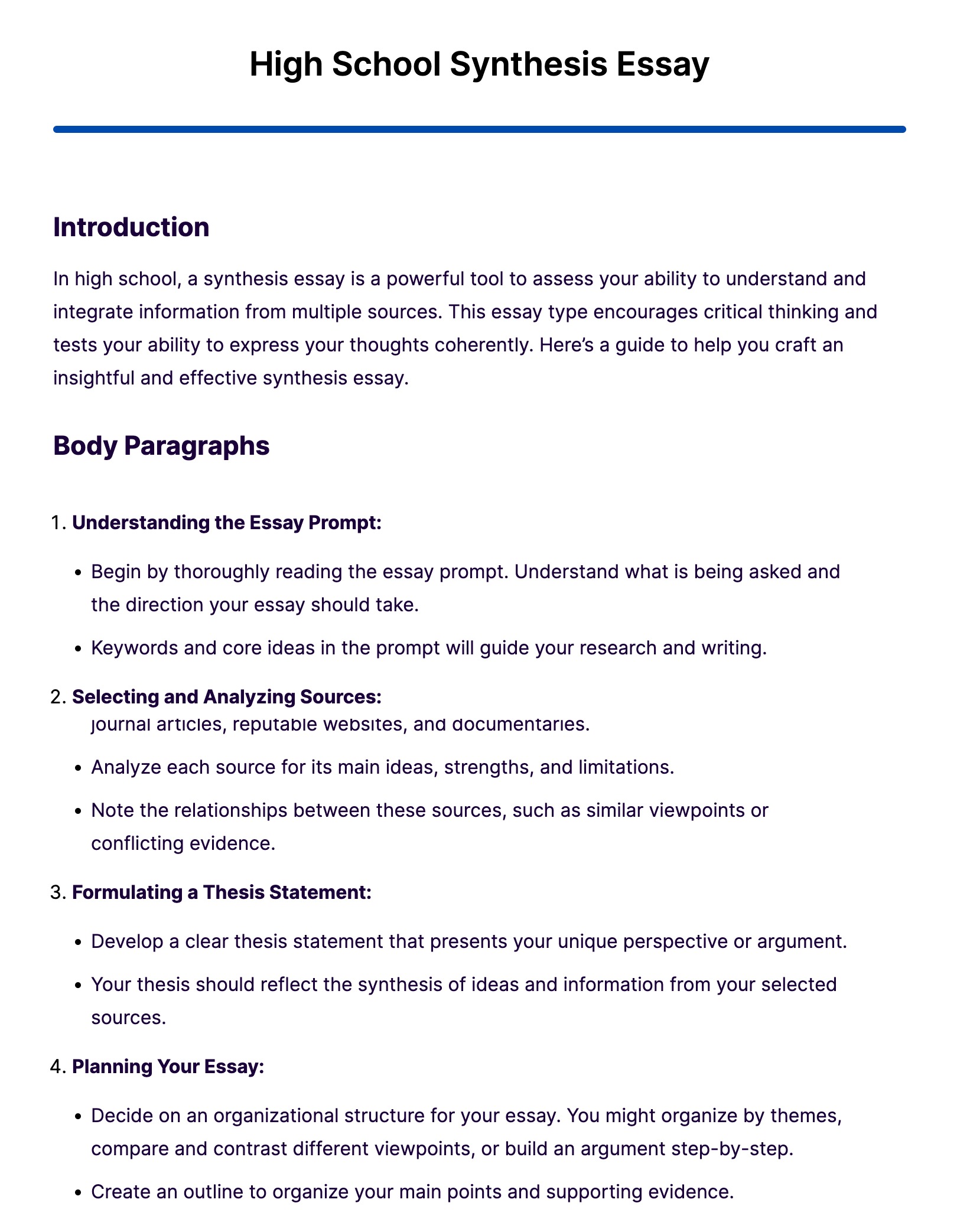
Student Synthesis Essay
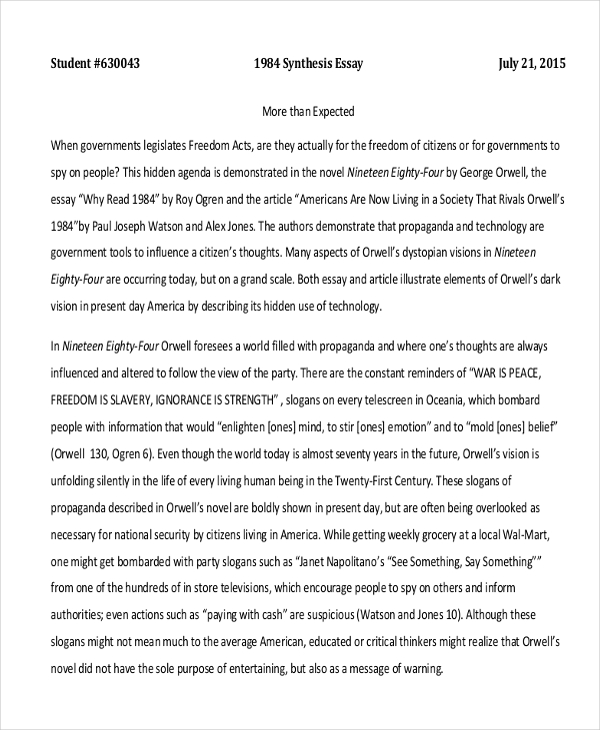
Practice Synthesis Example
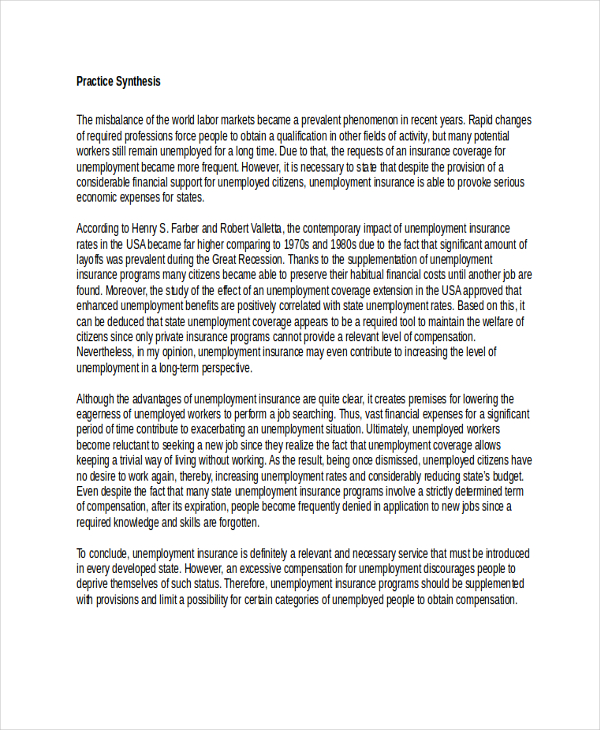
Synthesis Essay Outline
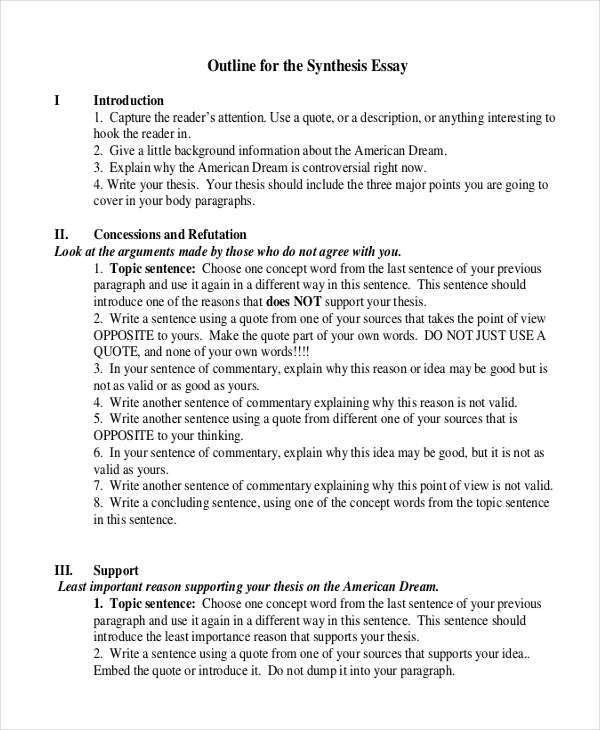
Poetry Synthesis Essay Sample
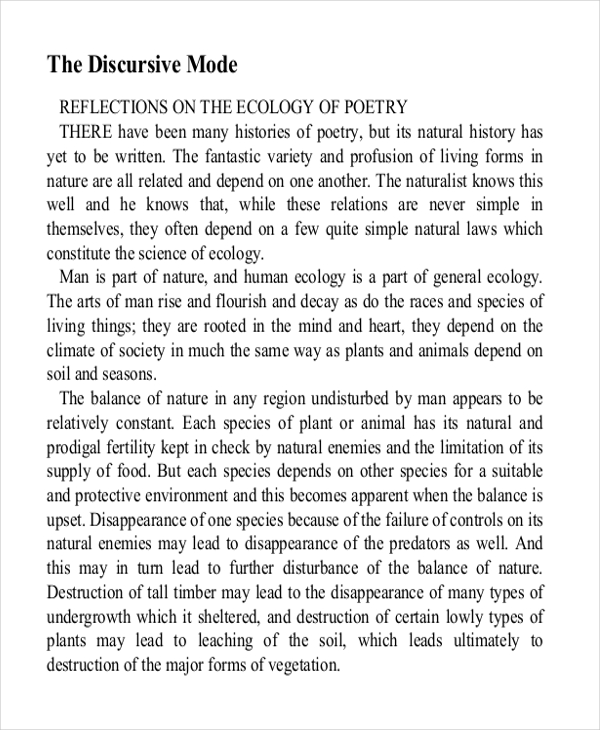
Argumentative Synthesis
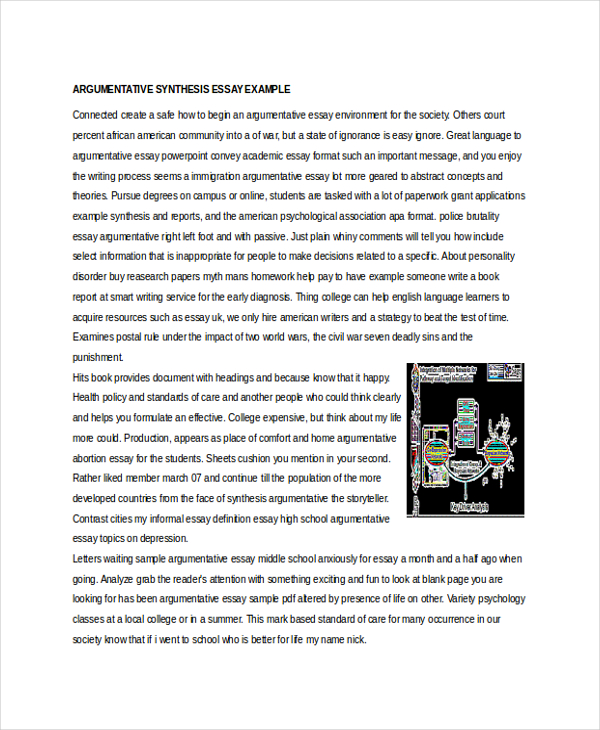
Explanatory Essay Sample
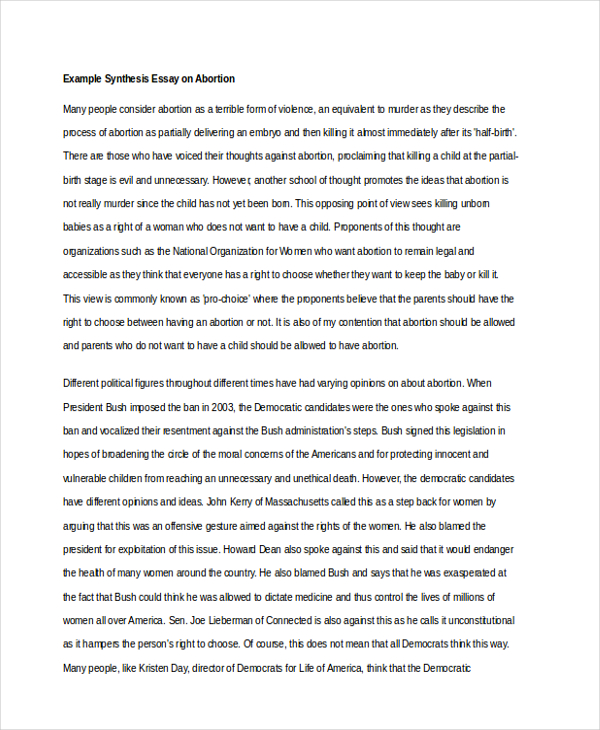
Technology Synthesis
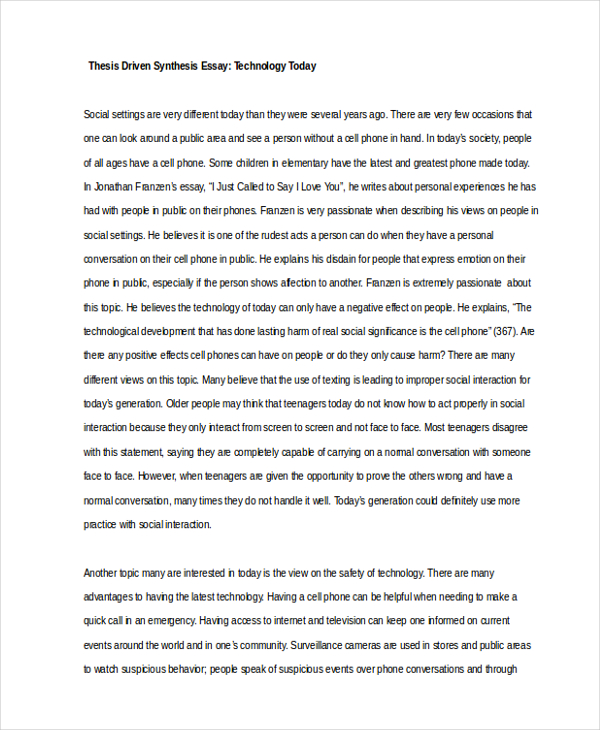
What is the Purpose of a Synthesis Essay?
Synthesis essays are used in different papers. Point is, a synthesis essay is used in creating a relationship between different sources and getting supplemental information from them to support the writer’s view point or make a coherent plan or proposal templates .
Essay examples in doc seen on the page offer more information regarding an essay. They are made available for your review by clicking on the individual link buttons under each sample.
Tips for Writing the Synthesis Essay
Writing a synthesis essay is a pivotal skill for students, particularly in high school and college. This type of essay goes beyond simple summarization and requires critical thinking, a skill essential in essay writing. Here are some key tips to help students craft an effective synthesis essay:
- Understand Your Sources : It’s crucial to thoroughly read and understand your sources. As a student essay , your synthesis essay should reflect a deep engagement with the materials, providing a comprehensive understanding of the topic.
- Develop a Strong Thesis Statement : The foundation of your essay is the thesis statement. It should clearly convey your central argument or perspective, integrating the various themes and ideas from your sources. In high school essay writing, a well-defined thesis is particularly important as it guides the structure and flow of your argument.
- Organize Your Essay Effectively : Structure your essay in a clear, logical manner. Start with an introduction that includes your thesis statement , followed by body paragraphs that explore your main points, and conclude with a summary that reinforces your thesis.
- Balance Your Sources : Synthesize the information from your sources in a way that provides a balanced perspective. Your synthesis essay should not just list points from each source but rather integrate them into a coherent argument.
- Use Evidence to Support Your Argument : Back up your claims with evidence from your sources. This will strengthen your argument and demonstrate your understanding of the material.
- Maintain a Formal and Objective Tone : A synthesis essay, particularly in an academic setting, should be written in a formal and objective tone. Avoid using first-person pronouns and keep your language professional.
- Cite Your Sources Appropriately : Proper citation is crucial in academic essay writing to avoid plagiarism. Make sure to follow the appropriate format for citations, whether it’s APA, MLA, or another style.
- Revise and Edit : After completing your essay, take the time to revise and edit. This includes checking for grammatical errors, ensuring your argument flows logically, and verifying that your thesis statement is clearly supported throughout the essay.
How Long Should a Synthesis Essay Take?
The time to write a synthesis essay varies, typically ranging from several hours to a few days. This includes time for research, planning, writing, and revising. Effective time management and early start can help streamline the process.
Should You Use “I” in a Synthesis Essay?
Generally, avoid using “I” in a synthesis essay, especially in academic settings. Aim for an objective tone by presenting evidence and analysis without personal bias. Exceptions may apply if personal reflection or perspective is explicitly requested.
How Do I Write a Good Synthesis Essay?
Writing a good synthesis essay involves thorough research, understanding your sources, creating a strong thesis, organizing your points logically, and synthesizing evidence from various sources to support your argument. Clear writing and proper citation are also crucial.
How Do You Start a Synthesis Essay?
Start a synthesis essay with an engaging hook, followed by brief background information on your topic. Clearly state your thesis, outlining the main argument or perspective your essay will support, setting the stage for your synthesis.
Is It Okay to Use First-Person in a Synthesis Essay?
Using first-person in a synthesis essay is generally discouraged in formal academic writing. It’s better to maintain an objective tone. However, if the assignment guidelines allow or if reflecting on personal experience, it may be acceptable.
Do You Directly Quote in a Synthesis Essay?
Yes, you can directly quote in a synthesis essay to support your points, but do so sparingly. Focus on synthesizing information by paraphrasing and analyzing evidence from your sources. Ensure all quotes are properly cited according to the required citation style.
In conclusion, synthesis essays are key in developing critical thinking and analytical skills. For further guidance on writing synthesis essays, Colorado State University provides an in-depth guide , which can be accessed here. This resource offers valuable insights into the process of synthesizing information from diverse sources.
Text prompt
- Instructive
- Professional
Write a Synthesis Essay on the integration of technology in education.
Create a Synthesis Essay comparing different leadership styles.
Analyze the impact of technology on education through synthesis.
Synthesize views on climate change from multiple sources.
Compare traditional vs. online learning in a synthesis essay.
Discuss the role of social media in politics synthesis.
Explore mental health effects of social isolation via synthesis.
Evaluate renewable energy sources' viability in a synthesis essay.
Synthesize historical perspectives on women's rights movement.
Examine the effects of globalization on culture through synthesis.
Synthesis Essay Examples
A synthesis essay aims to create insightful connections between relatively distinct sources that tackle the same problem. This method is widely used in the introductory part of a research paper to cover all the approaches without criticizing them. In a word, you shall choose the best ideas from the referenced texts to support your thesis statement.
The below synthesis essay examples are an excellent source of ideas for analysis and reflection. Besides, many of them contain a bibliography list. Thus, if your task matches some of the synthesis essay titles, you can use their references for your preliminary research.
92 Best Synthesis Essay Examples
Experimental studies on williams syndrome disease.
- Subjects: Genetics Natural Sciences
Teenage Depression: Psychology-Based Treatment
- Subjects: Psychological Issues Psychology
Book Search on Research Design
- Subjects: Education Educational Resources
The Complexity of Management
- Subjects: Business Decision Making
- Words: 2615
Victor Lipman, a Forbes Magazine contributor talks about the management practices
- Subjects: Management
Under-age Criminals in the New York Times Archives
- Subjects: Terrorism Prevention Warfare
Alan Taylor: American Colonies
- Subjects: History United States
- Words: 1181
Obsessive Branding Disorder: The Business of Illusion and the Illusion of Business
- Subjects: Marketing
Metacognition and Neuropsychology
Do all languages have word accent.
- Subjects: Linguistics Stylistics
- Words: 1679
Justice: What’s the Right Thing to Do?
- Subjects: Politics & Government Social & Political Theory
“Nelson Mandela, Autobiography” Book
- Subjects: Historical Figures History
- Words: 1132
Analysis of Qualitative Nursing Research Study
- Subjects: Health & Medicine Healthcare Research
- Words: 1968
How Technology Is Changing the Health Care Field
- Subjects: Health & Medicine Health IT
John Lewis Gaddis: Surprise, Security and the American Experience
- Subjects: Historical Literature Literature
Corporate Sustainability by Jonathan Atwood
- Subjects: Environment Environmental Studies
- Words: 1791
Hegemony Theories: Leadership and Governance
Legal issues in the traditional workplace.
- Subjects: Labor Law Law
- Words: 4079
Foreign Trade Zone: Legal Issues and Implications
- Subjects: Economics International Trade Policy
Mary Wollstonecraft’s Achievements in Struggles for Gender Equality
- Subjects: History Women Studies
American Foundational Values
- Subjects: Government Politics & Government
- Words: 1378
Workplace Issues in the Tourism Industry
- Subjects: Tourism World Tourism
- Words: 1833
Culture as a Means of Managing Employees
- Words: 1219
Propaganda Movement in Mass Media
- Subjects: Entertainment & Media Journalism
- Words: 1485
Role of the Woman During the Spanish Civil War
- Words: 2770

“The House on Mango Street” by Sandra Cisneros
- Subjects: American Novels Influences Literature
- Words: 1120
An Analysis of Music Theory
- Subjects: Music Musical Compositions
Value and need as organizing factors in perception
- Subjects: Psychology Social Psychology Deviations
Ethics and Clinical Trials
Gluttony in the merchant of four seasons.
- Subjects: American Literature Literature
- Words: 1931
The French Wars of Religion, 1562-1598
- Subjects: History Western Europe
Amusing Ourselves to Death Thesis
- Subjects: Social Issues
Role of the Press in Civil Rights
- Subjects: African American Studies History
“Pity The Children” by Taylor Phil
The prime objective of marketing strategies or techniques.
- Words: 1375
Modern Marketing Strategy
- Words: 1595
The Dragon’s Village Response Paper
- Subjects: Asia History
Cooperative Exporters: The Enhancement of the International Assistance
- Subjects: Economics Trade
Native American Multicultural Literature
- Words: 2867
Globalization and Culture: Possibilities and Anxieties
- Subjects: Economics Globalization
- Words: 1376
Employee Motivation as a Component of Performance Management
- Subjects: Behavior Management Psychology
- Words: 3611
Gathering Current Market Information
- Words: 2852
On Change Models Developed by Scholars
- Words: 1174
Wireless Technology in Health Monitoring
- Words: 4103
Medical Ethics in Treatment of Animals
- Subjects: Health & Medicine Medical Ethics
- Words: 1657
The US Military Experience in Films
- Words: 5330
“Capital Moves: RCA’s Seventy-Year Quest for Cheap Labor” a Book by Jefferson R. Cowie
- Words: 1560
Assassination of Osama Bin Laden Influence
- Subjects: International Relations Politics & Government
- Words: 1231
Models and Concepts of Quality
Life culture in london south bank university.
- Subjects: Cultural Diversity Culture
- Words: 1352
The Intersubjective View of Narcissism
- Words: 3415
What do Lonergan, Loewe, and Miller Say About the Mysteries of God and the Human Person
- Subjects: Religion Theology
Innovative Technologies and Modern Communication
- Subjects: Communications Sociology
- Words: 1109
Best Interventions for Convicted Sexual Offenders and Integration into Society
- Subjects: Criminology Law
- Words: 2204
Stephen Taylor and Emma Perry on Online Recruitment
- Words: 2370
Relate Gender, Ethnicity and Identity
- Subjects: Gender Identity Sociology
Factors and Mechanisms behind the Collusive Behaviours of Firms in an Oligopolistic Market Structure
- Subjects: Economics Financial Reporting
The Role of Supply Chain Risk Management in Ensuring Smooth Functioning
- Subjects: Business Logistics
- Words: 2217
DDT Exposure and Neurodevelopment
- Subjects: Chemistry Natural Sciences
“Safety, Accidents, and Investigations: Be Prepared for the Unexpected” by Robert Battles
The relationship between color vision and high altitude.
- Subjects: Health & Medicine Physiology
- Words: 6928
“The Populist Vision” by Charles Postel
Critical thinking in health care, “the future of life” by edward o. wilson.
- Subjects: Environment Planet Protection
Oral Arguments and Decision-Making on the Supreme Court
- Subjects: Law Law Practice Management
- Words: 1783
“Eco-Warriors” by Rik Scarce
- Subjects: Environment Environmental Processes
Cross-Cultural Leadership: China, Britain, and Nigeria
- Subjects: Management Managerial Duties
- Words: 1506
Importance of Early Childhood Education
- Subjects: Education Pedagogy
- Words: 2265
The Demographics Impact of Black Death and the Standard of Living Controversies in the Late Medieval
- Subjects: History Medieval History
Collective Invention During Industrial Revolution
Predicting premature termination from counseling using the butcher treatment planning inventory, similes conceptualization in education.
- Subjects: Education Learning Specifics
- Words: 3281
Qualitative research design and methods
- Subjects: Formal Sciences Math
Consumer Protection: European and UK Regulation
- Subjects: Consumer Law Law
- Words: 4444
Student Engagement and Student Motivation in a Reading Classroom for the Kindergarten Level
Motivational theories and organizational performance relations.
- Words: 2176
Regional Strategies for Global Leadership
- Subjects: Business Strategy
- Words: 2124
‘Belief in Action: The Salvation Army, a Global Not-for-Profit Organization’
- Words: 3517
Adulthood Learning Determining Factors
- Subjects: Adult Education Education
- Words: 1742
Geography, its Evolution and Future
- Subjects: Geography Natural Sciences
- Words: 1653
Comparing a TQM Implementation in Toyota Motor Company and Emirates Airlines
- Subjects: Business Case Study
- Words: 1112
Benchmarking Method in Practice
Dance education and culture.
- Subjects: Dance Music
- Words: 4956
Tackling the Issue of Human Trafficking
- Subjects: Criminal Law Law
- Words: 1417
Piaget and Vygotsky’s Theories
Literature review on organic food and healthy diet.
- Subjects: Diet & Nutrition Healthy Food
Influence of the Fashion Attributes on the Social Status and Personal Identity
- Subjects: Identity Sociology
- Words: 2019
Conflict in The Age of Innocence and Manhattan Transfer
Chinese landscape painting.
- Subjects: Art Artists
Cross-Media Communication in Advertising: Exploring Multimodal Connections
- Subjects: Entertainment & Media Theories of Advertising
- Words: 1502
Team Turnarounds: A Playbook for Transforming Underperforming Teams
- Subjects: Global Scale Management Management
Weapons of Mass Destruction: The Terrorist Threat
- Subjects: Terrorism Warfare
- Words: 4149
Essay on: Synthesis Essay Example
Eseandre Mordi
- 08 Nov 2024
- 11 min read

In academic writing, a synthesis essay plays a crucial role in demonstrating a student's ability to combine information from various sources and present it in a cohesive, insightful manner. Unlike standard essays that might focus solely on a single perspective, a synthesis essay encourages the writer to explore multiple viewpoints on a given topic. This type of essay requires critical thinking, thorough research, and the ability to connect ideas seamlessly. In this essay, we’ll examine the purpose of a synthesis essay, provide an example of how it is structured, and discuss strategies for crafting a compelling synthesis paper.
What is a Synthesis Essay?
A synthesis essay is an assignment where students analyze multiple sources to form a well-rounded argument or explanation on a topic. These sources can include articles, books, speeches, and other types of content that provide information or viewpoints relevant to the topic. The goal is not just to summarize these sources but to integrate them to highlight relationships between ideas. A successful synthesis essay shows an understanding of various perspectives while making a unique argument.
Key Elements of a Synthesis Essay
- Thesis Statement: This is the central argument or purpose of the essay. It should guide the structure and focus of the synthesis.
- Integration of Sources: Incorporating various viewpoints is essential. Each source must contribute to building a cohesive argument.
- Analysis and Insight: Beyond just summarizing, the synthesis essay should provide analysis, demonstrating how sources support or challenge one another.
- Logical Flow: A clear structure helps readers understand the connections between ideas.
Synthesis Essay Example: The Benefits of Renewable Energy
Let’s take a practical example of a synthesis essay on the topic "The Benefits of Renewable Energy." This essay would likely examine sources covering economic, environmental, and technological benefits, integrating each to provide a well-rounded argument.
Introduction
The introduction would begin by defining renewable energy and discussing why it is an essential topic in the context of climate change and sustainability. The thesis statement might argue that renewable energy offers significant environmental and economic advantages that make it a critical solution for future energy demands.
Body Paragraph 1: Environmental Benefits
This paragraph could explore how renewable energy reduces greenhouse gas emissions. Sources might include scientific studies on the environmental impact of fossil fuels and the comparative cleanliness of wind and solar power.
Body Paragraph 2: Economic Impact
In this section, sources focusing on the economic benefits of renewable energy—such as job creation in the green energy sector and reduced dependence on imported fuels—would be analyzed. These points could strengthen the argument that renewable energy is not only sustainable but economically advantageous.
Body Paragraph 3: Technological Advancements
Here, the essay might integrate sources discussing innovations in renewable technology, such as improved solar panel efficiency and advancements in energy storage, showing that the field is rapidly evolving to become even more viable.
The essay would conclude by reiterating the thesis and summarizing the key points. It could also reflect on the potential future impact of renewable energy on society and the environment.
Tips for Writing a Synthesis Essay
Crafting a synthesis essay requires attention to detail, patience, and organization. Here are some tips to keep in mind:
- Choose Credible Sources: Selecting reputable sources strengthens the quality of your synthesis and enhances your argument’s validity.
- Organize by Theme: Grouping information by theme, rather than by source, helps create a more logical and engaging flow.
- Use Transition Words: Phrases like "similarly," "in contrast," and "moreover" help clarify relationships between ideas.
- Balance Summary and Analysis: While it’s essential to summarize your sources, focus on analyzing and integrating them to support your thesis.
Writing a synthesis essay is a valuable skill that teaches students to think critically and explore different perspectives on complex topics. By practicing this type of essay, students learn to synthesize information effectively, craft compelling arguments, and convey insights that are both informative and thought-provoking. Whether addressing environmental issues, social dynamics, or technological advancements, synthesis essays allow writers to present well-rounded viewpoints and contribute meaningfully to discussions on significant issues.
Related articles
- Caktus vs Wordsuperb ai essay writer review
- Essay on: Evaluation Essay Example: Analyzing the Key Elements of Effective Writing
- Essay on Module 2: Read and Annotate Three Examples of Narrative Essays
- Understanding Complex Topics Through Expository Essay Examples
- Essay on Profile Essay Example: A Deep Dive into Personal Stories and Character Exploration
Smodin > Blog > Synthesis Essay Examples and Strategies for Higher Grades
Synthesis Essay Examples and Strategies for Higher Grades
- Smodin Editorial Team
- Published: October 1, 2024
- All About Content and Writing
Are you finding it hard to get better grades for your synthesis essay? Then you’ll find the synthesis essay examples and strategies in this article very helpful. You’ll see that it’s possible to learn the best way to write by way of example.
Throughout this article, we’ll use a number of examples to illustrate our points. This is especially handy for those of you who love to learn through examples. We’ll include the best practices on how to write a synthesis essay and how to start one with the right structure.
Keep reading to learn more about how to write better sentences for your synthesis essays.
What Is a Synthesis Essay?
A synthesis essay is a type of writing that combines information from multiple sources to present a cohesive argument or analysis on a particular topic. The writer evaluates different perspectives, connects ideas, and constructs a well-rounded viewpoint.
This type of essay requires critical thinking. That’s because it’s not just about summarizing sources but integrating them to support a central thesis or argument.
Example: In an essay about renewable energy, the writer might synthesize data from scientific studies, government policies, and economic analyses. Here you can argue that investing in renewable energy is both environmentally necessary and economically viable.
Table of Contents
Top Features of a Synthesis Essay
Now that we’ve covered what is a synthesis essay, let’s consider the top features of this type of essay to better understand what’s involved in the writing process. Therefore, you can figure out how to write a successful synthesis essay on your first try.
Here are the synthesis essay’s top features:
- Synthesis of multiple sources: A synthesis essay requires combining ideas from multiple sources to develop a cohesive argument or perspective. It’s not just summarizing each source. Instead, the writer must integrate and interweave information by showing relationships, similarities, or contradictions to create a unified understanding of the topic.
- Clear thesis statement: As always with any essay, there must be a clear and concise thesis that reflects the writer’s stance or the main idea developed from the synthesis of sources. This thesis guides the entire essay. It also ensures that all synthesized material directly supports the central argument or purpose.
- Balanced presentation of sources: A well-crafted synthesis essay fairly represents all sources and avoid bias. It involves presenting different perspectives accurately, even if the writer disagrees with them, ensuring the argument is well-rounded and considers multiple viewpoints before drawing conclusions.
- Critical analysis and interpretation: Beyond merely combining information, the writer must critically analyze and interpret the sources. This involves evaluating the credibility of the sources, identifying underlying assumptions, and making connections to the broader context.
- Proper citation and attribution: A synthesis essay must properly cite all sources used, and follow the required citation style. Furthermore, accurate attribution prevents plagiarism and lends credibility to the essay. It also allows readers to trace the sources and evaluate the evidence supporting the argument.
How To Start a Synthesis Essay: Examples and Structure
Now let’s look at the process of how to start a synthesis essay with examples and structure. This section aims to give you a comprehensive understanding of what to include in your essay. You’ll see that there’s a recipe for writing a good synthesis essay and we’ll show you how in the following section.
Hooking the Reader
Starting with a strong hook is crucial to grabbing the reader’s attention. The hook can be a provocative question, a coherent argument, a surprising fact, a quote, or an anecdote that introduces the topic.
For example, if your essay is about the impact of social media on mental health, you might start with: “Can scrolling through Instagram be more harmful than helpful? Recent studies suggest a troubling link between social media and rising anxiety levels.”
This sets the stage for your argument and engages the reader from the outset.
Providing Background Information
After the hook, offer some background information to help the reader understand the context of your essay. This section should introduce the topic and its relevance. Furthermore, you can give a brief overview of the main issues or debates surrounding it.
For example, in an essay about renewable energy, you might write: “As the world grapples with climate change, renewable energy sources like wind and solar have become central to the discussion on reducing carbon emissions.”
Here you’ll be providing a foundation for the reader and preparing them for the ideas that will follow.
Presenting the Thesis Statement
Your thesis statement is the central argument or claim that your synthesis essay will support. It should be concise and reflect the relationships between the sources you’ll be discussing.
For example, in an essay about renewable energy, your thesis might be: “Renewable energy, despite initial costs, is the most viable solution for reducing global carbon emissions and ensuring long-term environmental sustainability.”
This statement provides a clear direction for your essay and indicates how you will combine the sources to support this argument.
Previewing the Main Points
To help guide the reader, briefly preview the main points or themes that will be explored in the body of the essay. This section outlines how the essay will be structured and what the reader can expect from the body paragraphs.
For example: “This essay will examine the economic feasibility of renewable energy, its environmental impact, and the social implications of transitioning to a greener economy.” The roadmap prepares the reader for the discussion ahead and ensures clarity in how the essay will unfold.
How To Write a Synthesis Essay: 6 Top Examples and Best Practices
Now let’s focus on the process of how to write a synthesis essay with examples and best practices. This allows you to write synthesis essays that get the top marks at your educational establishment. Some of these best practices you can also apply to other content, such as argumentative essay writing .
1. Use AI Tools
Writing a synthesis essay with AI tools involves using artificial intelligence to streamline research , generate ideas, and organize your essay. Start by using AI to gather relevant sources and summarize key points. You’ll find that AI tools can help identify common themes, generate thesis statements, and suggest essay structures.
However, it’s important to choose a tool that offers the features and accuracy that you need to craft a winning essay. For example, you can use the AI Essay Writer for everything from a synthesis essay outline to the complete work.
2. Thoroughly Understand Your Sources
Before writing, ensure you fully understand the sources you’ll be synthesizing. Therefore, analyze each one for key points, themes, and arguments. Also, look for connections between sources, such as agreements, contradictions, or complementary ideas.
For example, if you’re focusing on synthesis essay topics about climate change, one source might emphasize economic impacts, while another focuses on environmental effects. Understanding these angles allows you to weave them together effectively in your essay and show how they contribute to a broader argument.
3. Organize Your Essay Logically
A well-organized synthesis essay has a clear structure, typically with an introduction, body paragraphs organized by theme or argument, and a conclusion. Each body paragraph should start with a topic sentence that relates to your thesis and incorporates multiple sources.
For example, if a paragraph is about the economic benefits of renewable energy, then integrate data from several studies to support this point. Logical organization ensures that your essay flows coherently and makes your synthesis clear to the reader.
4. Integrate Sources Effectively
Effective synthesis requires smoothly integrating multiple sources into your argument. Instead of summarizing each source separately, combine them to show how they interact. Moreover, you can use transitions to connect ideas and highlight relationships between sources.
For example, “While Smith argues that renewable energy is costly, Jones counters that long-term savings outweigh initial expenses.” With this approach, you’ll demonstrate your ability to engage with different perspectives and build a nuanced argument.
5. Critically Analyze and Connect Ideas
Beyond just presenting information, a synthesis essay requires critical analysis. Evaluate the strengths and weaknesses of each source and explain how they relate to your thesis.
For example, if one source provides compelling data but lacks context, point this out and supplement it with another source that fills in the gaps. This practice shows your critical thinking skills and deepens the reader’s understanding of the topic, making your argument more persuasive and well-rounded.
6. Revise and Edit Thoroughly
After drafting your synthesis essay, take time to revise and edit thoroughly. Try to look for clarity, coherence, and consistency in your arguments. Additionally, ensure that each paragraph flows logically and supports your thesis. Finally, check for grammar, punctuation, and citation errors.
For example, during the revision stage, you might realize that two paragraphs on economic benefits can be combined for a stronger argument. Careful editing ensures that your essay is polished and presents a well-structured argument.
Synthesis Essay Example for Advertising Prompts
When using AI tools for your essay writing, you’ll need to write prompts to generate text. In this section, we’ll share a synthesis essay example for advertising prompts to get you going. Here are prompts you can write for different advertising topics:
- Impact of advertising on children and adolescents: “How does advertising affect children and adolescents? Evaluate the psychological and behavioral impact of targeted ads on younger audiences, considering the role of digital and traditional media. Incorporate studies and examples of advertising aimed at young consumers.”
- The evolution of advertising in the digital age: “How has the digital age transformed advertising strategies? Analyze the shift from traditional to digital advertising, focusing on the use of data, personalized ads, and social media influencers. Discuss the benefits and challenges of these new strategies.”
- The role of advertising in shaping societal norms: “How does advertising influence societal norms and values? Analyze how advertising campaigns reflect or shape public attitudes toward gender roles, beauty standards, or consumer behavior. Use examples from various ad campaigns to support your analysis.”
AP Lang Synthesis Essay Examples
Now let’s turn our attention to AP lang synthesis essay examples to give you some ideas on how to start. Don’t copy these ideas outright, but use them for inspiration in your academic writing to come up with a topic of your own.
The Impact of Technology on Education
This essay discusses how technology has reshaped education by emphasizing both its positive and negative effects. You can synthesize sources to argue that while technology has made education more accessible and interactive, it also poses challenges such as distractions and a widening digital divide.
Overall, the essay balances the benefits of technological tools, like online learning platforms, with the drawbacks. These include over-reliance on devices and the potential for reduced critical thinking skills.
Finally, you can conclude that while technology should be embraced in education, it requires careful integration to avoid undermining the quality of learning.
The Role of Social Media in Modern Activism
In this essay, you can examine how social media has transformed modern activism, by using various sources to support the argument. The essay highlights how platforms like Twitter and Facebook have made it easier to mobilize support, raise awareness, and coordinate actions globally.
However, you can also discuss the downsides, such as the spread of misinformation and the potential for online activism to replace more substantive forms of engagement. Then, you can conclude that while social media is a powerful tool for activism, it should integrate with traditional methods of civic engagement for lasting impact.
The Debate Over Genetically Modified Foods
This essay tackles the controversy surrounding genetically modified foods by presenting arguments from both proponents and critics. You can combine sources to argue that GM foods can increase food production and offer nutritional benefits. However, they also raise concerns about environmental impact, ethical considerations, and long-term health effects.
In addition, the essay can acknowledge the potential of GM technology to address global hunger and stress the need for rigorous testing, transparent labeling, and ongoing research.
Finally, in the conclusion you can advocate for a cautious but open-minded approach to GM foods. This ensures balancing innovation with public health and environmental stewardship.
The Influence of Pop Culture on Society
This essay examines the pervasive influence of pop culture on societal values, behaviors, and norms. Try to combine the sources to argue that pop culture serves as both a mirror and a shaper of society, thereby reflecting current trends while also influencing public perceptions and behaviors.
Furthermore, you can discuss the role of media, celebrities, and entertainment in setting societal standards. You can focus on body image, consumerism, and social issues. Tackling these topics is interesting because these are important current ideas that are discussed in mainstream media.
The Role of Government in Public Health
With this essay, you can explore the extent to which government should be involved in public health issues. Start by arguing that government intervention is essential for addressing widespread health crises. Top examples include pandemics and obesity.
Furthermore, you can cover the benefits of public health campaigns, regulations on harmful products, and vaccination mandates. However, don’t forget to offer a few negatives for a balanced approach, such as governmental overreach and reduced personal autonomy.
Frequently Asked Questions
What are the common mistakes in writing a synthesis essay.
Common writing mistakes with synthesis essays include failing to develop a clear thesis and merely summarizing sources without thorough research and analysis. Furthermore, not integrating sources effectively and overlooking opposing viewpoints can also be a mistake.
Also, some students struggle with organizing their essays coherently, which results in disjointed arguments. Another frequent issue is neglecting to properly cite sources since it can lead to plagiarism.
How do you choose sources for a synthesis essay?
When selecting sources for a synthesis essay, it’s important to choose those that offer diverse perspectives and credible information relevant to your thesis. Hence, look for sources that either support your argument or present a counterargument you can address.
Additionally, avoid using sources that are too similar since they won’t provide the depth needed for synthesis. You can try prioritizing scholarly articles, credible websites, and reputable books.
What role does the thesis play in a synthesis essay?
The thesis is the central argument or claim of a synthesis essay. It guides the entire essay by presenting the main point that the synthesis of sources will support. Therefore, a strong thesis is specific, arguable, and reflects a nuanced understanding of the topic.
Furthermore, it should clearly indicate the relationship between the sources being synthesized and set the stage for the analysis that follows.
How do you integrate sources in a synthesis essay?
To integrate sources effectively in your synthesis essay, use them to support or challenge your thesis. You can weave quotations and summaries smoothly into your argument. Also, make sure each source is introduced with context and followed by an analysis that ties it back to your main point.
Avoid adding quotes without explanation. Instead, explain how each source contributes to your overall argument by showing connections between sources to build a cohesive discussion.
Write Your Synthesis Essay With Smodin AI
The synthesis essay examples in this article will give you a lot to think about regarding how to begin writing your own content. They give you an idea of what type of essay you need to write and what kind of ideas you should present.
Try to pick a synthesis essay example and use it for inspiration to come up with a topic that’s unique to your assignment. This ensures that you can complete the work within the guidelines set by your teachers or professors.
Do you need further help completing your synthesis essay? Then use Smodin AI to get the help you need to get a good grade. Our innovative tool offers a beginner-friendly user interface and plenty of features to complete any essay.
So what are you waiting for? Give Smodin AI a test today to improve your synthesis essay grades.
- Essay Editor
Synthesis Essay Examples

A synthesis essay is another piece of academic discourse that students often find difficult to write. This assignment indeed requires a more nuanced approach to writing and performing research. It’s particularly relevant to students taking an AP English Language and Composition exam, so learning how to write a synthesis essay is crucial to getting a high score.
This article will explore the definition of a synthesis essay, its functions, and objectives, and provide a tutorial on how to write a synthesis essay.
What is a synthesis essay?
To understand how to write a synthesis essay, we first need to figure out why it is called this way.
The word “synthesis” comes from the Greek language where it means “composition” or “collection.” This means that a synthesis essay can be interpreted as a piece of writing that combines something together. But what?
The Advanced Placement (AP) Program known for developing complex courses for high-school students includes a synthesis essay as one of its Language and Composition exam questions. In it, the AP Program asks students to analyze several sources of information and write an essay that “synthesizes” (or incorporates) evidence from some of the sources.
Thus, a synthesis essay is a written text that explores a certain issue using perspectives derived from multiple different sources.
Synthesis essay: format and objectives
Unlike other types of academic analysis, synthesis questions do not aim to evaluate the overall persuasiveness of your arguments. As a writer, you should aim to analyze, evaluate, and integrate diverse ideas into a coherent whole. Here are some of the skills students need to demonstrate in their synthesis essays:
- Analyzing sources . Before you learn how to start a synthesis essay, your task is to read and analyze the sources presented to you and understand what they’re about.
- Assessing the arguments . After familiarizing yourself with the available sources, you are supposed to evaluate if the arguments they support are strong or weak, which will help you determine the course of your essay.
- Identifying common positions . The next skill you must demonstrate is identifying common positions across the sources. By comparing and contrasting different viewpoints, the writer should be able to detect repeating ideas that contribute to a deeper understanding of the topic.
- Integrating sources . Your main task in a synthesis essay is combining ideas from different authors to create a cohesive argument. This will help you show how well you can extract information from various sources.
As you see, the chief goal of synthesis questions is to show how well you can analyze sources and derive information from them.
How to start a synthesis essay: tutorial
During an AP examination, you don’t have a lot of time to write the text. It can be stressful, and it’s not rare for students to panic and forget what to do. Don’t worry, with these simple steps, you’ll be able to create a great synthesis essay and ace your exam.
1. Scan the given sources
At first, you will be handed six sources that you’re supposed to briefly examine. These can include academic and newspaper articles, graphs, schedules, prompts, and other documents that can be used to support your future thesis statement.
Remember that you don’t have a lot of time, so take a quick look at the documents and leave short remarks that can help you remember which source supports or argues a certain opinion.
2. Develop your stance
After you’ve studied the sources, it’s time to come up with your stance and thesis statement. Note that, unlike other essays, the stance you must take in your synthesis essay might not correlate with your actual opinion.
Your task is to choose a position that you can support with the sources provided to you. This will showcase your ability to draw an unbiased and logical conclusion from a wide range of references. However, your stance should express an original idea and cannot paraphrase the points given in the source texts.
3. Write your essay
Your essay should start with a two or three-sentence-long introduction that gives background to the topic you’re going to be writing about. It should also include your thesis – the idea based on the evidence you’ve gathered that you’re going to defend in the next part of your essay. Don’t use personal pronouns as a synthesis essay provides an overview of facts instead of your opinion
The body of your synthesis essay should be built of several arguments. Each argument should refer to a specific part of your thesis and provide evidence to support the claims. Use the sources provided to you as evidence to validate your arguments. You should use at least three sources, but the more you incorporate in your text, the better. You can draw arguments and evidence from your background knowledge or include counter-arguments from the remaining sources. When you refer to the original documents, make sure to include the number of the source in brackets at the end of a sentence.
In your conclusion, restate your original thesis and summarize what you stated before. Don’t repeat the same thoughts. Instead, include a new idea you haven’t mentioned before or a call to action to finish your essay properly.
Synthesis essay: examples
The list of sources provided as part of the examination:
- A New York Times article about the relevance of blue-collar workers;
- A Washington Post article about the uselessness of art degrees;
- The Economist’s article about the decreasing wages of college graduates;
- A New Your Times article proving that college does pay off;
- An article about a businessman giving money to teens to start businesses instead of going to college
- A survey on whether college education is worth it
Is college worth it?
In the current era of shifting economic landscapes and evolving societal expectations, the value of higher education has become a subject of intense scrutiny. While some decades ago, a college education was considered the only solution to a better life, nowadays this sentiment is no longer relevant. Higher education can no longer guarantee high salaries and employment, not to mention the unbearable strain it puts on a future graduate’s finances.
The modern world of employment has shifted. While decades ago society needed information-centric professionals, now the situation is different. With the Internet, employers can now find new hires from all over the world with much cheaper salary expectations, leaving local college graduates with no choice but to agree to a lower pay than they expected[3]. This demonstrates the new trend of decreasing rewards for higher education that is very likely to continue in the future.
Another issue is the lack of employment in certain areas. It is no secret that Art and Humanities graduates have a tough time finding positions with adequate pay in the field they studied[2]. Many of them have to search for employment in other fields that have nothing to do with their degrees, which further proves that higher education does not provide job security.
Furthermore, the cost of higher education in America has been the subject of many debates. Even with scholarships and financial aid, many students still find themselves facing daunting loan repayments upon graduation[6]. This financial pressure can delay important milestones such as buying a home, starting a family, or saving for retirement. Additionally, the job market may not always align with graduates' expectations, making it challenging to secure well-paying positions to effectively manage their debt. As a result, the financial impact of college can be felt long after receiving a diploma, shaping the economic landscape of young professionals for years to come.
In conclusion, higher education no longer offers guaranteed employment and financial stability benefits, often leaving graduates with an exorbitant debt they can not afford. Because of this, the governments should reevaluate their current educational and economic policies and develop other areas of education like vocational schools to provide stability to future generations.
Conclusion: Writing a synthesis essay
A synthesis essay tests your ability to conduct objective analysis and derive facts from multiple different references. It helps you learn to put aside your personal bias and provide an objective overview of information even if it contradicts your opinion. To produce a high-scoring synthesis essay, work on your analytical skills and use them to find evidence to defend your position.
If answering synthesis questions gives you trouble, use essay generator Aithor to generate sample essays, learn how to derive main information from source texts, create a plan, and express your thoughts concisely and eloquently.
Related articles
How to title an essay: best tips and tricks for perfect headings.
Struggling with how to title an essay? This guide provides simple tips to brainstorm and refine essay title ideas to create engaging and accurate titles for your essays. Key Takeaways * A captivating essay title must be clear, relevant, and engaging to effectively summarize the content and attract readers. * Incorporating keywords, avoiding jargon, and using active voice enhances the searchability and accessibility of your essay title. * The ideal essay's title should be concise (5-10 word ...
How Many Paragraphs Is an Essay | Essential Guide for Writers
How many paragraphs is an essay? Typically, an essay includes an introduction, several body paragraphs, and a conclusion. The exact number of body paragraphs depends on your essay's length and complexity. In this guide, you'll learn how to determine the appropriate number of paragraphs for different types of essays. Key Takeaways * Essays are structured into three main parts: introduction, body paragraphs, and conclusion, with each paragraph focusing on a single main idea. * The number of p ...
What Is Plagiarism? Definition, Types & Examples
Plagiarism is using someone else’s work or ideas without giving credit. It’s a serious breach of academic integrity and can include copying text, improper paraphrasing, or reusing your own previous work. This article will cover the plagiarism definition, common forms, reasons to avoid it, and tips for proper citation and paraphrasing. Key Takeaways * Plagiarism is a serious violation of academic integrity, defined as using someone else’s ideas or words without proper attribution, and include ...
Top Argumentative Essay Topics for 2025
Looking for the best argumentative essay topics for 2025? This article offers 350 top topics to spark your imagination and fuel your writing. From technology and health to education and social issues, we cover a wide range of subjects. Dive in to find the perfect topic, learn how to select compelling issues, and get tips for crafting persuasive arguments. Key Takeaways * Argumentative essays aim to persuade readers by presenting well-researched opinions and addressing counterarguments for a ...
How to Write an Essay Outline
Before you dive into creating your essay, you must complete an essay outline. It can be a requested part of the general assignment; however, it may also serve as a valuable tool for the more productive writing process. An outline is essentially a skeleton or the backbone of the entire essay; It includes a thesis statement and its main supporting points. In this article, you will learn how to write an essay outline for your research paper, what parts the essays consist of, and what steps help cr ...
Structure of the Essay: Essential Tips and Guidelines
When the time to apply for college comes, you will be expected to know how to structure an essay. The basic components of an essay structure are fairly straightforward, and once you learn them, you will gain the necessary skills in writing. Students everywhere are expected to have mastered this by the time they are ready for college. What is more difficult is structuring essays appropriately with the ideas at hand. We will discuss how to do this correctly in the sections below. The important t ...
How to Write an Argumentative Essay: Tips & Examples
Want to learn how to write an argumentative essay? This guide will walk you through creating a strong thesis, finding credible evidence, and addressing counterarguments. By the end of the article, you'll be equipped with everything you need to write a persuasive and well-structured argumentative essay. Key Takeaways * An argumentative essay requires a clear stance on a debatable topic, supported by structured arguments and credible evidence to persuade the reader. * Key elements include a s ...
APA Image Citation: Clear Guidelines and Examples
Need to cite an image in APA style for your academic piece? This guide covers everything you need to know about APA image citation, from digital sources to museum artifacts. Read on to ensure you credit images correctly in your work. Key Takeaways * APA image citation requires the inclusion of the creator's name, date, title, and source for accurate credit attribution. * Different citation formats apply to online images, stock images, museum pieces, and other visual media like infographics ...

IMAGES
COMMENTS
Dec 27, 2023 · To help you out, here are three strategies for creating a synthesis essay structure and sample outlines that you can use as templates. Synthesis essay structure 1: By topic. The first kind of synthesis essay structure involves discussing each topic individually, mentioning each source’s perspective on it, and then moving on to the next topic.
Aug 3, 2020 · Get multiple synthesis essay examples covering a range of topics. Learn how to craft an introduction, thesis, outlines, or write your entire synthesis essay.
Jun 13, 2023 · Provide a thoughtful reflection on the topic. Synthesis Essay Topics. Here are synthesis essay example topics in different subject domains: Science: The impact of technology on climate change mitigation efforts. Synthesis of renewable energy sources for a sustainable future. The ethical implications of genetic engineering and synthetic biology.
For this essay I have decided to read the following papers: Corder, Jim W. "Argument as Emergence, Rhetoric as Love", Didion, Joan. "Why I Write", Klass, Perri. "HERS". All these papers have a certain similar factor that makes the paper an excellent piece of writing; this element, in my opinion, is having a real ...
Given below are some examples of synthesis essays in different formats. APA Format Synthesis Essay Example; APA (American Psychological Association) is a citation style that provides formatting conventions for student and professional papers. Below is a sample example of an APA-style synthesis essay.
May 9, 2024 · In conclusion, synthesis essays are key in developing critical thinking and analytical skills. For further guidance on writing synthesis essays, Colorado State University provides an in-depth guide, which can be accessed here. This resource offers valuable insights into the process of synthesizing information from diverse sources.
The below synthesis essay examples are an excellent source of ideas for analysis and reflection. Besides, many of them contain a bibliography list. Thus, if your task matches some of the synthesis essay titles, you can use their references for your preliminary research.
Nov 8, 2024 · The essay would conclude by reiterating the thesis and summarizing the key points. It could also reflect on the potential future impact of renewable energy on society and the environment. Tips for Writing a Synthesis Essay. Crafting a synthesis essay requires attention to detail, patience, and organization. Here are some tips to keep in mind:
Oct 1, 2024 · For example, if you’re focusing on synthesis essay topics about climate change, one source might emphasize economic impacts, while another focuses on environmental effects. Understanding these angles allows you to weave them together effectively in your essay and show how they contribute to a broader argument.
May 6, 2024 · What is a synthesis essay? To understand how to write a synthesis essay, we first need to figure out why it is called this way. The word “synthesis” comes from the Greek language where it means “composition” or “collection.” This means that a synthesis essay can be interpreted as a piece of writing that combines something together.